Student profiles

Alia Azmi
Email: a.azmi@uea.ac.uk
OrcID: 0000-0002-2473-7651
Academic profile
Undergraduate degree and Master’s research at Universiti Teknologi MARA; research experience includes environmental management; air pollution; and infectious diseases.
Current research
PhD title: National Policy on Environment and its Impact in Malaysia: From The Perspective of Local Communities and Stakeholders

Alice E Lown
Email:aelown@essex.ac.uk
ResearchGate | LinkedIn | ORCiD
Profile
In 2010 I graduated with a first class degree in Marine Biology from Newcastle University where I studied alarm pheromones in the signal crayfish Pacifastacus leniusculus, supervised by Dr. Matthew Bentley. I then completed three months research in Madagascar as an intern with Community Centred Conservtion. Here, I was part of a group studying the shark fin trades of Northern Madagascar and also researching turtle nesting areas.
In 2011 I started my MRes at Swansea University in Sustainable Aquaculture and Fisheries. My project title was “Adaptive variation and local adaption in brown trout Salmo trutta” supervised by Prof. Carlos Garcia De Leaniz. During this project I was funded by KESS under the European Social Fund and worked with the Environment Agency Wales studying behavioural, colouration and morphological differences of brown trout using digital photography between physically separated populations by natural and anthropogenic barriers on the Tawe and Teifi rivers in South Wales, completing both lab work and field work.
After my MRes I was immediately hired by Dr. Martin Stevens to work as a paid research assistant in his Sensory Ecology team at Cambridge University where we then moved to Exeter University Cornwall campus in 2013. In this role I worked on a BBSRC grant titled “Predator vision and defensive coloration from mechanism to function”. I completed a range of behaviour and antipredator colouration experiments primarily with Carcinus maenas and Gobius paganellus using human visible and UV digital photography to research animal camouflage.
Current research
I am now starting my PhD at Essex University supervised by Dr. Thomas Cameron and Dr. Leanne Appleby Hepburn. My PhD NERC funded under EnvEast and is also partnered with the Kent and Essex Inshore Fisheries Conservation Authority, Essex Wildlife Trust and the Blackwater Oystermen Association and titled “Ecology of the native Oyster (Ostrea edulis): developing best practice for economic and environmental sustainability of an important regional fishery”. It is a CASE (Collaborative awards in Science and engineering) project and it aims to cross borders between academia (University of Essex), government (IFCA), NGOs (Essex Wildlife Trust) and industry (Blackwater Oystermen Association).
The first part of this project will work in close collaboration with the Kent and Essex Inshore Fisheries and Conservation Authority (the CASE partner). Extensive spatial habitat mapping of the estuary will be undertaken to ascertain location and extent of Special Area of Conservation (SAC) features that coincide with existing oyster populations and the abundances of different predator and competitor species that coincide with current and historical oyster populations.
Publications
Stevens, M., Broderick, A. C., Godley, B. J., Lown, A. E., Troscianko, J., Weber, N. & Weber, S. B. (2015). Phenotype – environment matching in sand fleas. Biology Letters. 11: 20150494
Stevens, M., Lown, A.E., & Wood, L.E. (2014) Camouflage and individual variation in shore crabs (Carcinus maenas) from different habitats. PLoS ONE. 9(12):e115586. DOI:10.1371/journal.pone.0115586
Stevens, M., Arenas, L. M. & Lown, A. E. Colour in camouflage, mimicry and warning signalling. In: Elliot, Andrew, Fairchild, Mark and Franklin, Anna (eds.) Handbook of color psychology. Cambridge University Press. (In Press)
Stevens, M., Lown, A.E., & Denton, A.M. (2014). Rockpool gobies change colour for camouflage. PLoS ONE. 9: e110325.
Covered by: National Geographic, Science Daily, IFL Science (15 October 2014), and more
Stevens, M., Lown, A.E., & Wood, L.E. (2014). Colour change and camouflage in juvenile shore crabs Carcinus maenas. Frontiers in Ecology and Evolution. DOI: 10.3389/fevo.2014.00014
Troscianko, J., Lown, A.E., Hughes, A.E. & Stevens, M. (2013). Defeating crypsis: detection and learning of camouflage strategies. PLoS ONE. 8: e73733.
Covered by: New Scientist, International Business Times, and Science Daily (10 September 2013).
Conferences
Posters: Association for the Study of Animal Behaviour annual conference (Aberystwyth 2012), International Society for Behavioural Ecology (New York, 2014).
Presentations: Marine Biological Association 9th Postgraduate annual conference (Cork 2012), ExBase (Penryn 2013), CamoCon (Bristol 2013), Association for the Study of Animal Behaviour annual conference (Sheffield 2014).
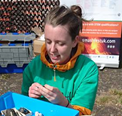
Bridie Verity Davies
Email: Bridie.Davies@uea.ac.uk
Profile
My masters degree from Imperial college was in Geology including a year abroad at Utrecht University in the Netherlands. My PhD project focusses on understanding the transition from an effusive to explosive eruption style on Ascension Island working alongside researchers from Durham, BGS and SUERC as well as those at UEA. I am passionate about understanding volcanic processes and how communities interact with their environments with an aim to improve volcanic hazard prediction and mitigation, reducing vulnerability through community engagement. My MSci project focussed on the characterisation of I-Type (Iron rich) micrometeorites, examining the mineralogical and tetxural evolution of the particles during atmospheric entry with an aim to determine their parent body. Through work at the Science Museum and with SmashFest UK I have developed a passion and understanding for science communication across all age groups.
Current Research
“Critical controls on eruptive behaviour of an intraplate volcano”
Determining whether a volcano will erupt passively or explosively is a key question when assessing the volcanic hazard faced by a community. The purpose of this project is to use the petrographic analysis of a series of genetically-related volcanic rocks that have erupted in a variety of ways to understand what has controlled the magma’s behaviour and ultimately the impact of the eruptions. This will be achieved through careful sampling of a suite of rocks representing a range of felsic activity, as guided by a recently completed project on the geological and geochemical context on Ascension Island. Techniques including petrographic analysis of thin sections and 3D tomographic sampling (University of Durham) will enable reconstruction of similarities and differences in the processes during a variety of eruptive events and thus the conditions prior to eruption. . Comparison between samples which have been stratigraphically well described in the field will provide an analysis of the changes in eruptive style. Research will be carried out in collaboration with researchers from the University of Durham and the Natural History Museum as well as UEA. This project will be part of a larger ongoing collaboration between UEA, Durham, SUERC and the BGS (http://community.dur.ac.uk/ascension.volcanology/).
Publications
“The mineralogy and petrology of I-type cosmic spherules: Implications for their sources, origins and identification in sedimentary rocks” – Dr Matthew J. Genge, Bridie Davies, Martin D. Suttle, Dr Matthias van Ginneken and Dr Andy Tomkins. Geochimica et Cosmochimica Acta, accepted for publication (2016).
Conferences
MSci Poster presentation at The Royal Astronomical Society London Dec, 2015. Title "The Characterisation of I-type Antarctic Micrometeorites"
Supervisory team and Research Group
Primary Supervisor: Dr Jenni Barclay
University of Durham and the Natural History Museum
SUERC and the BGS
Other relevant activities
Outreach work with SmashFest Uk – creating and running workshops
Experienced in science communication through work as an "Explainer" at the Science Museum London.
Experience as an Undergraduate teaching assistant at Imperial College London

Brisneve Edullantes
Email: be16998@essex.ac.uk
ORCiD: 0000-0003-4998-5018 | ResearchGate
Profile
I have a BSc in Biology (University of the Philippines Cebu, 2009) and an MEng degree in Marine Environmental Engineering (MMU, South Korea, 2012). My primary research interest is the ecophysiology of phytoplankton; particularly, how their functional role as primary producers in the aquatic food web and as regulators in biogeochemical cycle are influenced by the varying environmental factors, e.g. light quality, nutrient availability, vertical mixing and stratification, and predation.
In my Master’s thesis, I investigated the dynamics of phytoplankton photophysiology and primary productivity in an altered river estuary in a temperate region over an annual cycle using instantaneous and in situ measurements using Fast Repetition Rate Fluorometry (FRRF). I also identified factors that influence the variability of photophysiological variables and primary productivity in a turbid river estuary. My recent research works include the pattern of phytoplankton community structure in coastal areas affected by anthropogenic activities, i.e. water pollution and oil contamination.
PhD title: The interactions of multiple environmental stressors and their influence on the physiology and ecology of harmful bloom forming algae
I will investigate how synergistic and antagonistic interaction of multiple climate change stressors (i.e. warming, ocean acidifications, eutrophication etc) can influence the ecophysiological and evolutionary responses of HAB-forming phytoplankton under the supervision of Dr Etienne Low-Decarie (University of Essex). I will conduct laboratory experiments to investigate the photosynthesis, food uptake, and growth of bloom forming phytoplankton in different growth conditions. Experimental evolution will be employed as the approach to investigate whether phytoplankton can evolve over a few hundred generations in response to specific environmental drivers and to quantify the fitness gain and changes in traits of the evolved populations. Individual and combined effects of the changes in environmental variables on the phytoplankton ecophysiology, clonal and genetic diversity will be carried out to investigate synergistic and antagonistic interactions of these stressors. Lastly, through experimental and modelling techniques, a new model will be developed to predict how climate-driven genotypic and phenotypic changes in the phytoplankton community structure affect its role to provide food to organisms at the higher trophic level.
Publications
- Edullantes, B and R Galapate. 2014. Embryotoxicity of Copper and Zinc in Tropical Sea Urchin Tripneustes gratilla. Science Diliman 26(1): 25–40.
Grants
- Short-term Monitoring of Coral Reef Marine Protected Areas (MPAs) in the Municipality of Liloan, Cebu, Central Visayas. UP Cebu Creative and Research Grants 2014.
- Assessment of phytoplankton abundance, species composition and diversity in oil spill-affected Calawisan Bay in Lapu-Lapu, Cebu. UP Cebu Creative and Research Grants 2013.
Conferences:
Oral Presentation
- Edullantes, B, and YS Sin. 2015. Climatological mixed layer dynamics and its impact on phytoplankton biomass in an altered river estuary. International Conference on Biodiversity, Ecology and Conservation of Marine Ecosystem 2015 (BECoME 2015). June 1 to 4, 2015. School of Biological Sciences, The University of Hongkong, Pok Fu Lam, Hong Kong.
- Edullantes, B. 2015. Patterns of net phytoplankton community in oil spill affected sites in southern coast of Mactan Island, Cebu. UP Cebu Creative Works/Research Grants Presentation. March 4, 2015. University of the Philippines Cebu Union Building, Cebu City, Philippines.
- Edullantes, B, YS Sin and KH Shin. 2011. Assessing Phytoplankton Primary Production by Comparing Estimates from Fast Repetition Rate Fluorometry and 13C Technique. The Korean Society of Oceanography 2011 Conference. November 3-4, 2011. Seoul, Republic of Korea.
Poster Presentation
- Edullantes, B, S Sangutan and M. Pocong. 2015. Preliminary post oil spill assessment of phytoplankton community structure, biomass and primary productivity in Calawisan backwaters, Lapu-lapu City. 27th Annual Heinrich Schoenig Biology Symposium. March 14, 2015. CAFA Theater, University of San Carlos, Talamban, Cebu City, Cebu, Philippines.
- Edullantes, B, J Malazarte and YS Sin. November 2014. Patterns of climatological mixed layer and critical depths in Youngsan river-estuary. The Korean Society of Oceanography 2014 Conference. Jinhae, Republic of Korea.
- Edullantes, B and YS Sin. 2012. Role of vertical mixing on phytoplankton productivity in a turbid river estuary. The Korean Society of Oceanography 2012 Conference. May 31 to June 1, 2012. Daegu, Republic of Korea.

Bruce Steel
Email: B.Steel@uea.ac.uk
Profile
I am a BSc (Hons) Biomedical Science graduate and, as of last year, an MSc Industrial Biotechnology graduate. My undergraduate dissertation was focused on the detection of antibiotic resistant bacteria in poultry meat through the use of disc diffusion assays and PCR analysis using custom designed primers targeting genes encoding resistance to clinically significant antibiotics. My MSc project was carried out during an industrial placement with Recyclatech Group Ltd and was focused on the extraction of complex biosurfactants from Recyclatech’s patented strain of bacteria and downstream process optimisation. After graduating from my MSc, I secured a full-time position with Recyclatech as a research assistant, during which I was part of a small team tasked with scaling up their industrial process from lab-scale to industrial-scale.
Following on from my research in industrial biotechnology, I have decided to do a PhD in a topic area related to this. My PhD research topic is focused on microbial lignin degradation in the environment, which has many implications in industrial biotechnology, primarily chemical synthesis and biofuel production.
Current Research
‘Microbial lignocellulose degradation in the environment’
Almost 20% of the total mass of the Earth comprises lignocellulosic biomass also known as dry plant matter, a mixture of organic molecules, containing mostly lignin, cellulose and hemicellulose. However, lignin is an extremely resistant polymer to degradation due to its complex structure and strong chemical bonds and makes the utilization of lignocellulosic biomass difficult. Microbial lignin breakdown through enzymes such as peroxidases or laccases creates a great potential of utilizing this abundant biomass for sourcing sugar for generation of useful biochemicals and biofuels. However, most work has been carried out on the role of fungi in lignin degradation with little work on their bacterial counterparts.
The central aim of this PhD project is to study and compare the activity of microbial lignin degradation in a variety of environments (including permafrost and forest soils, coastal and estuarine sediment), combining methods such as nucleic acid stable isotope probing (DNA/RNA-SIP) and next generation sequencing (meta-omics and bioinformatics) to link microbial physiology to ecosystem functioning. This will be supported by the use and investigation of pure cultures and enzyme assays. In particular, we want to determine the key microorganisms responsible in the various environments and their pathways for lignin degradation.
Supervisory Team
Dr Jennifer Pratcher - University of East Anglia, School of Environmental Sciences
Dr Jonathan Todd - School of Biological Sciences, University of East Anglia
Dr Dennis Goevert - Recyclatech Group Ltd. (CASE)
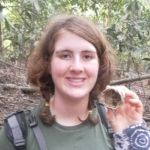
Camilla Ryan
Earlham Institute | School of Environmental Sciences, University of East AngliaEmail: Camilla.Ryan@earlham.ac.uk
Camilla Ryan
Email: Camilla.Ryan@earlham.ac.uk
Twitter: @CamillaRyan33
Profile
I am a PhD student based at the Earlham Institute (EI) and University of East Anglia, supervised by Dr Matt Clark (EI) and Prof Cock van Oosterhout in the School of Environmental Sciences at UEA. My background is in conservation, ecology and molecular ecology and I have experience working in the field and laboratory. I am currently further developing my bioinformatics skills. In the past I have studied African plants, Samango monkeys, Ryeland sheep, Grevy’s zebra and ancient DNA. My primary interest is in how cutting edge sequencing technology can be coupled with practical conservation to develop long term strategies to help save endangered species.
My PhD project ‘Genome wide analysis of drift and selection of drift and selection using historic and contemporary samples of the endangered Mauritius pink pigeon’, which is co-supervised by Dr Diana Bell (UEA), Prof Carl Jones MBE (Durrell Wildlife Trust), Prof Ian Barnes (Natural History Museum) and Dr Lawrence Percival-Alwyn (EI), aims to bring together zoos & zoo keepers, museums and researchers to genetically rescue and continue to conserve the endangered pink pigeon.
By sequencing DNA extracted from pink pigeon museum samples from the 1800s and comparing it with contemporary genetic data I hope to be able to identify regions of the pink pigeon genome that have lost genetic diversity or is under balancing selection. In particular I want to examine the highly variable immune genes and use this information to help develop a genetic supplementation program that increases both genetic diversity and the number of resistant alleles within the pink pigeon population. This approach should help reverse some of the negative impacts of inbreeding and increase the pink pigeons’ resistance to the pathogen Trichomonas gallinae which currently kills over 60% of fledglings.
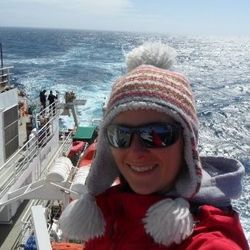
Cecilia Liszka
Email: ceclis56@bas.ac.uk | c.liszka@uea.ac.uk
LinkedIn profile | ResearchGate profile
Profile
I hold a broad range of interests in relation to the natural world and how it functions alongside the human component, with my current focus being the biology and ecology of the marine environment. In particular, I am interested in the biological role of the oceans in moderating climate, and how particular biologically-driven, or ecological, processes may be expected to change under a changing climate.
In addition, I have previously held positions with public, private and voluntary sector organisations with a focus on climate change mitigation and/or adaptation, specifically working on domestic energy efficiency and implementation of renewables as energy generation and resilience technologies.
I have skills in research planning and delivery; project management; providing high level political briefings; financial and budgetary management; strategy and policy development; and staff management.
Recent qualifications and research
2013/14 MSc Environmental Science (University of East Anglia) (Distinction)
Dissertation title: Elucidating the physiological role of rhodopsin proton pumps in marine dinoflagellates
2013 Research project for Renewable World Nepal
Project title: Investigating the potential for greater dissemination of renewable energy technologies as climate change adaptation interventions through the NAPA and LAPA Frameworks
2002-5 MA Geography (Cambridge University)
Dissertation title: Investigation into the effect of canopy cover on ground flora vegetation & soils of the Canadian Rockies
Professional Memberships
Marine Biological Association
Current research
I am currently working on a PhD to investigate the active flux of carbon in the Southern Ocean and its sensitivity to climate change, in a collaboration between the British Antarctic Survey and the University of East Anglia.
In particular I am looking at the role of vertically migrating zooplankton in mediating an active transport of carbon from the surface ocean to the interior, through two primary modes of flux: respiration of carbon dioxide and the production and sinking of faecal pellet organic carbon.
My research is focussed on a transect of differing oceanic regimes in the Scotia Sea section of the Southern Ocean and will look at experimental data and samples collected on fieldwork campaigns in the Southern Ocean, as well as looking at historical samples of zooplankton community composition and structure.
Supervisory team
Primary Supervisor: Dr Geraint Tarling (BAS)
Secondary Supervisors: Dr Carol Robinson (UEA), Clara Manno (BAS), Gabi Stowasser (BAS)
Other activities
BAS/ EnvEast activities:
I am on the BAS Student Symposium 2015 Committee and help to coordinate webinars for the EnvEast DTP students.
Outreach and engagement:
I have represented BAS at the Cambridge Science Festival 2015 and am actively looking for opportunities to increase my outreach by taking my science into schools.
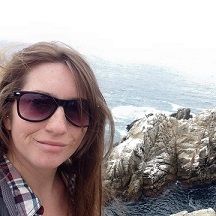
Charlotte Davies
University of East Anglia | School of Biological SciencesEmail: Charlotte.S.Davies@uea.ac.uk
Charlotte.S.Davies@uea.ac.uk | OrcID
Project Title Offspring or survival: Antagonistic effects and the maintenance of genetic variation in an isolated island population of Seychelles warblers
Profile
My first substantial research experience came while completing my undergraduate dissertation on the brown argus butterfly (Aricia agestis) at the University of Bristol. This work introduced me to the idea that within a species, differing environmental factors can drastically influence trade-offs between reproduction and dispersal. I then went on to complete a master’s degree in Biodiversity and Conservation at Leeds University, where, I conducted a dissertation aimed at determining how behavioural and environmental factors influence reproductive success and survival within the little tern (Sterna albifrons).
After this, I worked as a research associate on a collaborative project between Duke, Cambridge and Zurich University exploring neuro-endocrine and behavioural mechanisms of female dominance and reproductive skew in wild meerkats (Suricata suricatta). Through direct manipulation of prenatal androgen exposure; this project examined the expression and acquisition of female dominance, and patterns in the behavioural, endocrine, and reproductive development of offspring.
Current research
I will be investigating how different mechanisms interact to maintain genetic variation at immune genes within an isolated island population of Seychelles warblers (Acrocephalus sechellensis). Specifically, I will be focusing on the role pathogens have in maintaining MHC variation using modern molecular tools. Additionally, I will be looking at how different mechanisms associated with the maintenance of genetic variation can have antagonistic effects upon reproduction and survival.
Publications
Dimac-Stohl, K. A.*, Davies, C. S.*, Grebe, N. M.*, Stonehill, A. C., Greene, L. K., Mitchell, J., ... & Drea, C. M. (2018). Incidence and biomarkers of pregnancy, spontaneous abortion, and neonatal loss during an environmental stressor: implications for female reproductive suppression in the cooperatively breeding meerkat. Physiology & behavior. (*denotes co-first authors)
Davies, C. S., Smyth, K. N., Greene, L. K., Walsh, D. A., Mitchell, J., Clutton-Brock, T., & Drea, C. M. (2016). Exceptional endocrine profiles characterise the meerkat: sex, status, and reproductive patterns. Scientific reports, 6, 35492.
Conferences
Talks: International society of behavioural ecology (ISBE), Exeter (2016). Society of integrative and comparative biology (SICB), Portland, Oregon (2016). Animal behavior society (ABS), Anchorage, Alaska (2015).
Posters: JEM Symposium (Beaufort, North Carolina, 2015).
Research group
Primary supervisor: David Richardson
Secondary supervisor: Hannah Dugdale
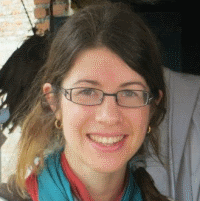
Charlotte Monteil
Email: C.Monteil@uea.ac.uk
ORCiD: 0000-0002-8930-7038
Academic profile
I have always been fascinated by the way that people inhabit their environment, and I started my studies by taking an interdisciplinary Bachelor degree in Geography with a specialisation in Environmental Studies, at the Institut de Géographie Alpine, in Grenoble, France. The course integrated the analysis of society with the analysis of the environment, themes which I continued in my post-degree work with the PAPRIKA project in Nepal.
I worked to analyse the vulnerability and capacities of people facing flash floods in the plain area of Nepal (Terai). Using a large range of participatory research tools, including Participatory 3-Dimension Mapping, I focused on two villages, studying the relations between caste system and vulnerability, and enhancing local capacities (in partnership with local communities and I/NGOs) to face floods. In parallel with this project, I took a Masters degree in Development Studies at the Université Panthéon-Sorbonne, in Paris (France), and then for the second year, back at the Institut de Géographie Alpine. I have been progressively specialising in "natural" disasters studies with a social-science perspective. I participated in different projects, including spending one month in Morocco working on the risk of earthquake in Tetouan and trying to find suitable adaptations to live with this risk and to become less vulnerable.
PhD title
Societal recovery and adaptation following volcanic eruptions.
Current research
My PhD project at the UEA reflects my interest in disaster studies. I work on societal recovery and adaptation following volcanic eruptions, with Peter Simmons and Anna Hicks. This project, part of the global STREVA project, aims to address the lack of understanding of short and long-term recovery and adaptation processes in communities and monitoring agencies affected by volcanic eruptions. Using qualitative methods, I will identify the parameters that influence the recovery and adaptation of communities, and I will try to develop a tool to measure these processes.
Publications
Monteil C., 2012, Vulnerability, Capacities and Caste System in facing floods in Terai area (Nepal), thesis, Institut de Geographie, Paris I
Gaillard J.C., Monteil C., Perrillat-Collomb A., Chaudhary M., Chaudhary S., Chaudhary O., Giazzi F., Cadag J.R., 2013, Participatory 3-dimension mapping: A tool for encouraging multi-caste collaboration to climate change adaptation and disaster risk reduction, Applied Geography.
Gaillard et al., 2013, Participatory 3-Dimensional Mapping: a tool for practitioners, Cafod
Monteil C., 2013, Capacities development to face floods. The case of Bochahi village in Nepal, thesis, Institut de Geographie Alpine Université Joseph Fourier, Grenoble
Research groups & supervisory team
Strengthening Resilience in Volcanic Areas project
3S Science, Society, and Sustainability research group, University of East Anglia.
Geosciences and Natural Hazards research theme, School of Environmental Sciences, UEA
Primary supervisor: Mr Peter Simmons
Co-Supervisors: Prof Jenni Barclay, Dr Anna Hicks, Dr Roger Few

Chiara Borsellino
Email: C.Borsellino@uea.ac.uk
Profile
I have a master degree in Marine Biology and Ecology and a bachelor in Marine Environmental sciences. I worked for 2 years in an Experimental Oceanography and Marine Ecology laboratory in Italy where I also carried out my Master thesis on the Analysis of the Escherichia coli dynamics in Civitavecchia bathing areas using the multi-platform coastal observing system C-CEMS (Civitavecchia-Coastal Environment Monitoring System). During the last year I worked as a volunteer in the Plymouth Marine Laboratory.
Current Research
Understanding the flows of carbon through the shelf seas using cutting edge sampling systems and analysis technique.
The dissolved organic matter (DOM) in seawater forms an important and poorly understood component of marine biogeochemistry. DOM in UK coastal waters is supplied by rivers and groundwater, from offshore waters and also generated by internal biogeochemical cycling. DOM cycling contributes to carbon sinks within coastal waters and as DOM is exported offshore. (Thomas et al., 2004, Engel et al., 2004, Passow and Carlson, 2012). DOM also represents an important short term store of nutrients which can be regenerated on timescales of weeks to months. DOM characterisation is also required for the interpretation of satellite data (Cao and Miller, 2015). Thus DOM cycling in coastal waters is an important component of coastal biogeochemical and relevant to the CEFAS Science and Evidence strategy.
This UEA CEFAS studentship will involve:
1. Further analysis of the Smartbuoy archive for DOM to derive complete seasonal cycles at all the North Sea Smartbuoy sites.
2. Use of fluorescent characterisation of the DOM (EEM-PARAFAC) to discriminate DOM sources in coastal waters.
3. The LOCATE programme will study the estuarine behaviour of terrestrial DOM, focussing on three estuaries in Scotland, Wales and S.W. England.
4. Develop policy advice around the management of DOM and its implications in UK coastal waters.
Publications
- Zappalà, G., Caruso, G., Bonamano, S., Madonia, A., Piermattei, V., Martellucci, R., Di Cicco, A., Pannocchi, A., Stefanì, C., Borsellino, C. and Marcelli, M. (2016). A multi-platform approach to marine environment assessment in Civitavecchia (Rome) area, Journal of Operational Oceanography.
- Bonamano, S., Madonia, A., Borsellino, C., Stefanì, C., Caruso, G., De Pasquale, F., … & Marcelli, M. (2015). Modeling the dispersion of viable and total Escherichia coli cells in the artificial semi-enclosed bathing area of Santa Marinella (Latium, Italy). Marine Pollution Bulletin.
Conferences
- Analysis of the Escherichia coli dynamics in Civitavecchia bathing areas using the multi-platform coastal observing system C-CEMS (Civitavecchia-Coastal Environment
Monitoring System. General Assembly 2015 of European Geosciences Union, Vienna,
Austria (12-17 April 2015).
- The Civitavecchia Coastal Environment Monitoring System (C-CEMS): an integrated
approach to the study of coastal oceanographic processes. General Assembly 2015 of European Geosciences Union, Vienna, Austria (12-17 April 2015).
- Modeling the fate of faecal bacteria in near-shore coastal waters. 40 th CIESM Congress, Marseille, France (28 Oct-1 Nov 2013).
Supervisor
Dr Martin Johnson

Chris Barrell
Email: C.Barrell@uea.ac.uk
Profile
I have chosen to focus my study on climate change as I feel a strong commitment to tackle global warming to protect human lives and the environment. Currently working for a PhD in Arctic Meteorology, I hope to contribute to the improvement of the representation of the Arctic region in weather and climate prediction models.
My university education began with a BSc in Renewable Energy at the University of Exeter. For my dissertation I designed and assessed the feasibility of a renewable energy scheme at Glenshee Ski Centre, Scotland. Throughout the course I learnt much about the stark reality of climate change and felt driven to study this further. This led to my MSc in Climate Change at the University of East Anglia. The inception of my master’s thesis projecting changing snow over Scotland with climate change was driven by my interest in UK winter weather and my realisation of the fragility of the Scottish Highland environment during my bachelor’s dissertation. This project fueled my interest in polar meteorology and climate with a determination to pursue a research career in this field.
Current Research
Investigating cold-air outbreaks over the subpolar seas
The aim of my research is to improve the representation of cold-air outbreaks in the UK Meteorological Office’s Unified Model (MetUM) for operational weather forecasting, seasonal forecasting and climate modelling. Over the subpolar seas cold-air outbreaks commonly affect UK winter weather. They are also important within the climate system affecting sea-ice formation and driving ocean convection, playing a significant role in creating dense water masses that feed into the Atlantic Meridional Overturning Circulation, a key component of the global ocean circulation system.
In my project I will be investigating cold-air outbreaks using a number of case studies gathered from aircraft-based and ship-based field campaigns. I will be running the MetUM at high resolution to simulate these cases and making use of the in-situ observations to challenge the model forecasts. I will be testing various new model parameterizations, for example, testing the ‘blended’ 3D/1D turbulence scheme; testing new developments in cloud microphysics parameterization; and simulating cloud streets. I will also be joining the Iceland-Greenland Seas Project, part of the Year of Polar Prediction project, on a field campaign making new boundary-layer observations over the Iceland Sea.
Supervisory Team
Professor Ian Renfrew (Primary)
Dr Steve Abel

Claire Armstrong
Email: C.Armstrong@uea.ac.uk
ORCiD: 0000-0003-3874-4243
Academic profile
In 2010 I graduated with a BSc (Hons) in Wildlife Conservation from the University of Plymouth, where I developed my knowledge of ecology, animal behaviour, conservation methods and evolutionary biology. During this time I undertook a student placement for seven months with the Game and Wildlife Conservation Trust in their Lowland Game & Wildlife Research department. For my dissertation I surveyed populations of tropical fruit-feeding butterflies to investigate the effects of forest disturbance on community structure.
A strong interest in evolution and the use of genetics as tools for conservation led me to complete a Masters of Research in Evolutionary Biology at the University of Bath in 2013. Whilst there I gained skills in molecular phylogenetics and quantitative genetics, and carried out two research projects: the effects of inbreeding and drought on plant growth and reproduction, and the relationship between gene duplication and alternative splicing as generators of functional genetic diversity.
PhD title: Evolving with pathogens: how pathogens drive genetic diversity over space and time in an endemic island bird.
Current research
I am using Berthelot’s pipit (Anthus berthelotii), a small passerine endemic to the Canary Islands and the Madeiran archipelago, as a model system to investigate the role of pathogens for influencing genetic variation at key immunity genes. Differing pathogen communities between populations, determined by environmental factors (eg. climate, altitude, island isolation), human influences (artificial water sources for malaria vectors, poultry farms), and chance colonisation/extinction events, are predicted to create spatial and temporal variation in selection upon host immune genes.
I will be characterising spatial genetic diversity at two families of the innate immune system, the Toll-like receptors and the avian beta-defensins, across the thirteen island populations of Berthelot’s pipit. Museum specimens across the pipit’s range dating from the 1870s to the 1910s will provide an insight into changing selection regimes over time, contrasting historical patterns of variation with contemporary genetic diversity.
Grants
John and Pamela Salter Trust travel grant to attend the 49th Population Genetics Group Meeting
Conferences
January 2015: 48th Population Genetics Group Meeting at the University of Sheffield, poster presentation.
Supervisory team
Other activities
2015 UEA CEEC Rebellion Conference organising committee.
Bringing Scientists to You two-day outreach event, East Norfolk Sixth Form College.
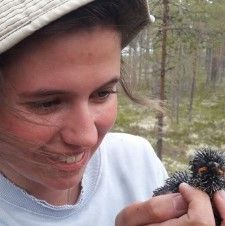
Claire Buchan
Email: c.buchan@uea.ac.uk
Profile
2010 – 2013 Joint Honours BA Anthropology and Archaeology, University of Durham
2013 – 2014 MSc Applied Ecology, University of Exeter. Research project: ‘Impacts of agricultural landscape features on moth populations: implications for agri-environmental management’
I have recently been involved with the IUCN Pangolin Specialist Group, running global-scale detection and occupancy analyses on camera trap data, with the aim of informing pangolin monitoring techniques.
I maintain an interest in projects for which I have previously worked as a field assistant, including the Sparrow Weaver Project, and a project examining brood parasite–host interactions.
Research interests
- Avian ecology
- Environmental policy
- Movement ecology
- Ecological adaptation to climate change
- Illegal wildlife trade
- Population ecology
Current Research
Demographic consequences of different migratory strategies in a partially migratory species
The advancement of spring temperatures in the Northern Hemisphere is one of the most tangible effects of global climate change. Long-distant migrants are particularly vulnerable to environmental change, being exposed to a potential complex of stressors. Certain species – such as the model for this study, the lesser kestrel (Falco naumanni) – appear to be altering migration behaviour, with an increasing proportion of individuals remaining in the breeding grounds all year.
This project focuses on understanding what underpins different responses to environmental change, and what consequences these responses have. Specifically, through monitoring migration behaviour and breeding success, the project aims to determine intraspecific and environmental predictors of migration strategy, and what impacts different strategies have on population demographics.
Supervisory Team
Main supervisor: Dr Aldina Franco (UEA)
Co-supervisors: Dr James Gilroy (UEA)
Dr Ines Catry (University of Lisbon)
Dr Phil Atkinson (BTO)
Other relevant activities
Member of the IUCN SSC Pangolin Specialist Group.
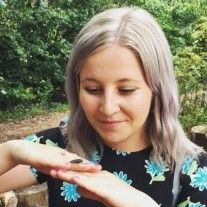
Claire Louise Stewart
The Durrell Institute of Conservation and Ecology (DICE), University of KentEmail: cls215@kent.ac.uk
Claire Louise Stewart
Email: cls215@kent.ac.uk & clairestewart2803@gmail.com
ORCiD | LinkedIn | Twitter | Research Gate
Profile
I completed my undergraduate degree BSc. Zoology at the University of St Andrews in 2014. Following this I travelled around Australia and worked as a Research Assistant with the Large Marine Vertebrate Project (LAMAVE) in the Philippines before starting an MSc in Conservation Science at the University of Queensland, Australia. I graduated with high distinction and was awarded the School of Biological Sciences International Scholarship in Conservation Biology. After my Masters I worked as a Research Assistant at the Centre for Biodiversity & Conservation Science (CBCS) at the University of Queensland until I returned to the UK in December 2016. I then worked as a Community Officer with GiGL (Greenspace Information for Greater London) and the London Wildlife Trust until beginning a PhD with the Durrell Institute of Conservation & Ecology (DICE) at the University of Kent in September. I am also on the Advisory Panel for GIGL.
Current Research
'Modelling future scenarios for conservation land-use in England'
This research will help inform future conservation and agriculture policy by answering the following questions:
1) Where are the priority areas in England for meeting biodiversity targets while minimising opportunity costs, and how will these change under climate change?
2) How does the optimal conservation approach for developing ecological networks on private land depend on the traits of the focal species being considered?
3) In which circumstances would new conservation strategies, based on longer-term stewardship agreements and/or improving landowner support, provide greater benefits?
Publications
Watson, J.E.M., Evans, T., Venter, O., Williams, B., Tulloch, A., Stewart, C., Thompson, I., Ray, J.C., Murray, K., Salazar, A., McAlpine, C., Potapov, P., Walston, J., Robinson, J.G., Painter, M., Wilkie, D., Filardi, C., Laurance, W.F., Houghton, R.A., Maxwell, S., Grantham, H., Samper, C., Wang, S., Laestadius, L., Runting, R.K., Silva-Chávez, G.A., Ervin, J., & Lindenmayer, D. (2018) The exceptional value of intact forest ecosystems, Nature Ecology & Evolution 2, pages 599-610.
De Jesus-Villanuev, C., Stewart, C.L. (2017) 18th Cambridge Student Conference on Conservation Science. Oryx. 51(03):398-399. PDF.
Awards
3rd prize for my poster at the Student Conference for Conservation Science at the University of Cambridge, March 2017
Dean’s Commendation for Academic Excellence, 2015 & 2016
Grants
$AUD 8000 School of Biological Sciences International Scholarship in Conservation Biology, University of Queensland, July 2015
Conferences
Poster presented at the Student Conference on Conservation Science (SCCS) in Cambridge, March 2017
Attended Society of Conservation Biology Oceania SCBO Conference in Brisbane, July 2016
Supervisory Team
Dr Robert Smith (DICE)
Dr Nicholas Macgregor (Natural England)
Dr Zoe Davies (DICE)
Dr Humphrey Crick (Natural England)
Other relevant activities
Advisory Panel member for GiGL
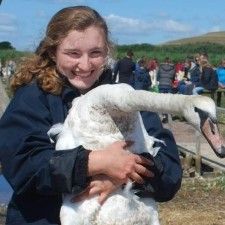
Claudia A Martin
Email: Claudia.Martin@uea.ac.uk
Profile
In 2016 I graduated with a BSc (Hons) in Biology from Cardiff University, where I developed a keen interest in evolutionary and conversation biology. As part of my degree I incorporated a Professional Training Year working for Slimbridge Wildfowl and Wetlands Trust, through which I developed advanced avian identification, handling and monitoring skills. This work involved practical management of the SSSI and Ramsar designated reserve for species of conservation priority. For my dissertation I conducted an experimental investigation of ecosystem resilience to climate change by monitoring the ecological impact of prolonged drought on upland streams.
I have since worked with Durrell Wildlife Conservation Trust using Population Viability Analysis to project genetic diversity and population viability for the endemic Madagascar Pochard (Aythya innotata) through a captive breeding programme and population reintroductions.
Current Research
Genomic signatures of adaptation in an island bird.
I will be using cutting edge genomic tools in combination with ecological fieldwork to enhance understanding of evolutionary adaptation in wild animals. Using genomic data, it is now possible to not only identify the genes under natural selection, but also their function and the ecological factors that drive selection.
Using Berthelot’s pipit (Anthus berthelotti) as a model system, I aim to identify the genetic and ecological basis of natural selection for this island endemic species. Specifically; which genes and biological processes are under natural selection? Moreover, many island birds are becoming endangered due to habitat degradation and climate change, so understanding their ecology and evolution is of paramount conservation concern.
Supervisory Team
Primary Supervisor: Dr Lewis Spurgin (UEA)
Co-Supervisors: Prof David S Richardson (UEA), Dr Brent Emerson (IPNA CSIC, CASE Partner)
Other relevant activities
Postgraduate demonstrator assisting undergraduate students with statistical analysis using R Programming Language, marker for module assessments and private tutor for A Level Biology.

Daniel Phillips
Plymouth Marine Laboratory and University of East AngliaEmail: Daniel.P.Phillips@uea.ac.uk
Daniel Phillips
Email: Daniel.P.Phillips@uea.ac.uk
Profile
Daniel is currently a PhD student of the EnvEast DTP based at Plymouth Marine Laboratory. Daniel graduated with a first-class BSc in chemistry (2017), winning multiple awards for his performance in analytical chemistry, and immediately began his postgraduate research. His research interests include atmospheric and marine chemistry, with his research project studying the air-sea transport, exchange and in-ocean reactions of anthropogenic pollution and key organic gases.
Daniel is an associate member of the Royal Society of Chemistry, and frequently engages with the peninsula section (south-west) committee as a Spectroscopy in a Suitcase (SIAS) demonstrator. Daniel is also a trained SCUBA diver (PADI: AOWD) with experience in ocean waters around south-west UK.
Research
‘Atmosphere-ocean exchange in the Anthropocene – how air pollution modifies the ‘smell of the sea’
Daniel’s project aims to study the air-sea transport (flux), exchange and in-ocean reactions of oxidising and acid precursor anthropogenic pollution, and the key organic gases (OVOC’s) that are important for the atmosphere and climate.
Firstly, the aim requires a detailed field measurement campaign of atmospheric and marine components at the Penlee Point Atmospheric Observatory, using a PTR-MS and spectroscopic instruments, and the surrounding seawater.
Secondly the aim requires laboratory-scale measurements of the air-sea exchange interface to understand the involvement of other chemical species and parameters in the reactions of the pollution and organic gases. Lastly, the aim requires numerical modelling to unify the laboratory and field measurements to understand the true effect of the pollution on the concentration of OVOCs in our oceans and atmosphere.
Research Group
Plymouth Marine Laboratory
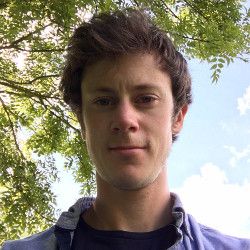
David Buchanan
Email: D.Buchanan@uea.ac.uk | ORCID: 0000-0003-4276-890X
Academic profile
I completed my Undergraduate degree at Loughborough University in Mathematics and Management in 2013. Following this I completed an MSc in Statistics at the University of Kent, obtaining a distinction. My dissertation involved modelling solar flare occurrences.
Current research
PhD Environmental Science, University of East Anglia in collaboration with the British Antarctic Survey, 2015-2019.
Research title: Southern Ocean Uptake of Atmospheric CO2: Where should we measure it?
Data from the Southern Ocean are relatively sparse and less well understood when compared with other major oceans, making it an interesting region to study. Of particular interest is the capacity for the Southern Ocean to remove CO2 from the atmosphere: a crucial variable when predicting future climate scenarios. The aim of this project is to use the GEOS-Chem atmospheric transport model to conduct an inversion of atmospheric CO2 data. This will involve incorporating the most recent measurements into the model to estimate the distribution of CO2 fluxes in the Southern Ocean.
In addition, to address the issue of data sparsity in the Southern Ocean, Observation System Simulation Experiments (OSSEs) will be completed for various observational networks. The result of these experiments will assist in network design decision-making, by identifying the potential measurement locations that would provide the optimal additional constraint on CO2 flux estimates in the Southern Ocean.
Supervisory Team
Dr Parvadha Suntharalingam (UEA)
Dr Anna Jones (BAS)
Prof Corinne Le Quéré (Tyndall Centre for Climate Change Research, UEA)
Other relevant activities
Graduate Teaching Assistant, University of Kent, 2014-2015.
Associate Tutor, University of East Anglia.

David Litchfield
Email: D.Litchfield@uea.ac.uk
Twitter: @litchfieldd
OrcID: 0000-0002-6702-5398
Academic profile
My educational and professional background has followed two main strands: one in the health and social care sector and the other in geosciences and natural hazards. After gaining a BSc in Human Cybernetics (University of Reading 1997), I returned to study four years later for an MA in Social Work (University of Nottingham 2003) where it included practical placements in the UK and Greece and a project exploring the use of evidence-based practice with older people. I have worked for a number of years with vulnerable adults both directly in different services before moving into the regulation of health and social care as an inspector and finally as an analyst focussed on the development, analysis and use of health and social care datasets. However, a career break in Latin America awakened an old interest in the natural world and especially volcanoes. So alongside my employment I gained a second undergraduate degree in Geosciences (Open University 2012) and an MSc in Geophysical Hazards (UCL 2014). Projects have included reviewing the risk to aviation from Icelandic volcanic risk, and an examination of stress fields around Ecuador’s Tungurahua volcano and their use in forecasting explosive episodes. I also spent an internship in Ecuador learning about volcano monitoring and community engagement.
My broad research interests are in the area of natural hazards and disaster risk reduction. I am particularly interested in volcanoes and in how science can be better applied and integrated with other disciplines including social sciences to increase its impact on reducing loss of life and livelihood from eruptive events.
Current research
My PhD project at the University of East Anglia began in October 2014 and reflects my interdisciplinary interests, focussed on the island of Dominica in the Lesser Antilles, home to 70,000 people and with the highest density of potentially active volcanic centres in the world. Recognising the uncertainties surrounding future eruptive events, I will gather data on the volcanic hazard as well as apply social scientific methods to better understand the vulnerabilities and resilience of the local community. I will then use the approaches being developed by the STREVA project to integrate these interacting factors into a volcanic risk assessment.
I am funded by the National Environmental Research Council (NERC) via the EnvEast Doctoral Training Partnership.
Supervisory team
Prof Jenni Barclay, Dr Anna Hicks, and Mr Peter Simmons of the School of Environmental Sciences, UEA
Dr Richard Robertson, University of the West Indies Seismic Research Centre.
Other activities
Student representative to the EnvEast DTP Management Board

David Pearce
Email: David.Pearce@uea.ac.uk | ORCiD
Profile
Throughout my university education I have maintained a particular interest in the practical application of molecular and microbiology to combat real-world problems.
I studied "Molecular Biology and Biochemistry" at Durham University followed by a Master's in "Post-Genomic Biology" at the University of York.
My Master's thesis (part of an industrial placement) was a successful proof of concept study investigating the suitability of a protein for development as a commercial biosensor scaffold.
Current Research
Biofilters for mitigation of landfill methane emissions.
Methane generated by the anaerobic decomposition of landfill waste represents a non-trivial component of anthropogenic greenhouse gas emissions. Methane is a climate active gas roughly 25 times as potent as CO₂.
A common management strategy is to convert methane to CO₂ through combustion with concomitant electricity generation. Unfortunately, this method becomes impractical at low methane concentrations. One potential solution is passive biofiltration using methane oxidising methanotrophs to remove methane from low content streams.
The aim of this PhD is to gain insight into the biology of the active methanotrophs present in a trial biofilter (operated by Norfolk County Council) in order to inform future biofilter design and operating parameters. To this end, the methanotroph community in the biofilter will be studied and the major contributors to methane oxidation identified, isolated and characterised. The behaviour of these key methanotrophs and alterations in the biofilter community as a whole will be observed under changing physico-chemical conditions. The results will assist further refinement and development of these landfill biofilters, helping to make methane removal as efficient and consistent as possible.
Research groups and Supervisory team
University of East Anglia, Environmental sciences
Primary supervisor:
Prof J Colin Murrell - University of East Anglia
Secondary supervisors:
Charles Wright - Norfolk County Council (CASE Partner)
Dr Andrew Crombie - University of East Anglia

Davis Laundon
Email: D.Laundon@uea.ac.uk & davlau@mba.ac.uk
Profile
The majority of marine biology lays beyond the naked eye. My research interests centre around understanding how marine microbes can elucidate our understanding of evolutionary histories and biogeochemical processes in marine systems. Throughout my undergraduate degree (BSc. Marine Biology, Plymouth University) I volunteered as a research student studying the cell and molecular biology of marine choanoflagellates – the closest unicellular relatives of the animals – to shed light on the evolutionary origins of animal multicellularity and synaptic signalling. I also became actively involved in science communication and public outreach, volunteering in museums and aquaria to disseminate marine research to a public audience – something I now hold central to my work and look forward to bringing into my PhD research.
Current Research
Fungal parasites of marine diatoms – the biology and ecology of marine chytrids
Chytrids (Phylum Chytridiomycota) are zoosporic fungi, which include parasites of marine diatoms. Data from freshwater systems suggest that chytrid parasites can play key roles in the regulation of diatom blooms and biogeochemical cycling. However, relatively little is known about the role of chytrid-diatom parasites in marine systems. Metagenomic datasets have revealed a huge diversity of uncharacterised marine chytrid groups, yet their impact on marine systems is very poorly understood. This project aims to improve our understanding of the interactions between marine diatoms and their chytrid parasites through field observations and molecular characterisation of chytrid-diatom ecological interactions. In addition, the project will establish laboratory model systems to investigate the cell biology of the host-parasite system. The project will be based at the Marine Biological Association in Plymouth.
Conferences
British Conference of Undergraduate Research (2017) – Oral presentation
International Congress of Protistology (2017) – Oral Presentation
Supervisory Team
Project Supervisor: Dr. Michael Cunliffe (MBA)
Co-Supervisors: Prof. Thomas Mock (UEA) and Dr. Glen Wheeler (MBA)
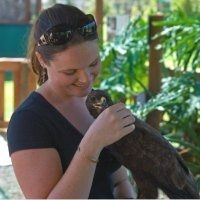
Deborah J Fogell
Durrell Institute for Conservation and Ecology, University of KentEmail: djf41@kent.ac.uk
Deborah J Fogell
Email: djf41@kent.ac.uk | OrcID: 0000-0002-4591-1911
Profile
I grew up in South Africa where I completed my undergraduate degree in Zoology and Ecology at the University of Cape Town. My Honours thesis focused on the range disjunction of an endangered species of frog in the Western Cape; where I used molecular genetics to analyse phylogeographic differences between the two populations as well as estimate the time at which they had become disjunct. I then moved to the UK and, after a few years out working in IT, decided to complete a taught MSc in Conservation Biology at DICE, University of Kent, where a project on Beak and Feather Disease Virus (BFDV) in Mauritius parakeets piqued my interest. My dissertation analysed the annual prevalence of BFDV in fledglings and assessed the repeatability of the screening protocol that is currently widely used by conservationists and researchers globally to detect the presence of the virus. After completing my MSc I decided to continue working on BFDV within the Mauritius system and completed an MRes in Biodiversity Management at DICE. This research investigated how viral incidence in fledglings related to life-history traits such as sub-population and the cleaning regime currently used by the Mauritian Wildlife Foundation to reduce the spread of infection. I also used the DNA data obtained from sequencing the viral haplotypes present within the Mauritius parakeet population to estimate the most likely global origin of BFDV on Mauritius and visualise how the virus has evolved on the island over time.
Current research
The provision of supplementary food (SF) has become a widespread tool for recovering populations of threatened species. Therefore, understanding the effects of SF is a fundamental question for population biologists. SF is often applied as a safety-net whilst the limiting factors of a threatened population are addressed, but a growing body of research also demonstrates that SF can sometimes hinder the population it is intended to help or can have wider negative effects. Using the long-term dataset provided by ongoing management and recovery of Mauritius parakeets, the primary aim of my PhD is to provide a rigorous study of the costs and benefits of providing SF; quantifying the potential benefits to productivity in a recovering population as well as the negative impacts provisioning has on the spread of infectious disease. I hope to determine the drivers of SF exploitation, individual levels of SF use, identify individuals in the population that behave as super-spreaders of infection and quantify the seasonal build-up of virions in the environment.
Grants
Genetics Society – Heredity Fieldwork Grant
African Bird Club – Conservation Award
Awards
Maurice Swingland Prize for outstanding performance on the taught MSc programme
Publications
Fogell, D. J., Tolley, K. A., & Measey, G. J. (2013). Mind the gaps: investigating the cause of the current range disjunction in the Cape Platanna, Xenopus gilli (Anura: Pipidae). PeerJ, 1, e166.
Conferences
Herpetological Association of Africa - presented
African Amphibian Working Group – presented
Mauritius Conservation and Management Symposium: Species to Systems - presented
Research groups
Conservation Genetics team – Durrell Institute of Conservation and Ecology
Institute of Zoology, ZSL
Other activities
I am a volunteer with the Kent Wildlife Trust, helping with coppicing and beach cleans where time allows. I also assist with great crested newt surveys weekly from February to July as part of an ongoing study of a closed population at the University of Kent. I qualified as a snake handler through the Field Guiding Association of South Africa which was a valuable asset during my fieldwork periods in the Cape.

Duncan Sweeney
Email: dsween@essex.ac.uk
ORCiD: 0000-0003-4667-6105 | LinkedIn | ResearchGate
Profile
Bsc Biological Sciences. I am interested in the field of chemical ecology, how and why organisms respond to chemical signals and cues of other organisms. For my thesis I investigated the effects of light stressed Arabidopsis on soil community composition. Similarly I have carried out investigations on changing production of these compounds by organisms, particularly isoprene and dimethylsulfide.
Current research
My current research during my PhD involves disentangling the effects of drought response in plant-microbe interactions. Investigating the effect of drought stress on plant physiology in terms of chemical compound production and whether this differential production has an effect on the surrounding microbial community in the soil. The project also looks to investigate the effect of these organisms on plant physiology, are microbes being selected for their beneficial effects? If given the ‘ideal’ microbial community under drought stress would a plant be better of physiologically?
Supervisory team
Dr Corinne Whitby
Microbial Ecology research group/Molecular Microbiology group, University of Essex
Dr Tracy Lawson
Plant biotechnology research group/Plant physiology group, University of Essex
Other relevant activities
- I have carried out a few public outreach teaching programmes where we communicated to the public the essence of our research, how it applies to them and why they should care.
- Student Staff Liaison Committee (SSLC) member (Course Rep), communicating the needs and worries of the students undertaking the course to heads of departments in meetings to ensure that both the needs of the students and departments are being met.
- During my undergraduate degree I carried out a lot of voluntary work in the following places:
Plant Physiology Laboratory
Molecular Microbiology Laboratory
Microbial Ecology Laboratory
Paramagnetic Resonance Laboratory
Coral Reef Research Laboratory
Algal Physiology Laboratory
Additionally a few projects have been undertaken by me during my voluntary placements:
Assessing salt marsh recovery success after the installation of gabions to protect salt marsh from erosion
Investigating the effects of stable and fluctuating light regimes on plant physiology and response.
Quantifying the amount of carbon in salt marsh soils both organic and inorganic

Elinor Tuffnell
Email: E.Tuffnell@uea.ac.uk
ResearchGate | Academia.edu | LinkedIn | OrcID
Profile
Having completed a BA in History and an MA in Classical Studies, my focus shifted to the sciences and I completed a BSc Open which combined my love for Chemistry and Environmental Science. I studied all three degrees with The Open University; during this time, I was privileged to take part in numerous field work studies investigating topics such as freshwater populations, shrubland ecosystems, temperature variations under various circumstances (for example with or without arboreal cover, in dry or waterlogged soil), and meteorological effects on honey bee activity.
While my background is quite eclectic, my current research interests are within the sphere of Environmental Science. A passion for analytical chemistry runs in the family, both my father and grandfather were chemists, and I am eager to follow in their footsteps. I’m particularly interested in analytical and atmospheric chemistry; Atmospheric processes have always fascinated me and I hope to focus heavily on the impact of anthropogenic emissions on the atmosphere, notably the effects of CFCs on stratospheric ozone.
Current research
Analytical chemistry in near-space: Exploring the stratosphere and its role in global climate
Despite the vital role played by stratospheric ozone, the stratosphere itself is still poorly understood. This project seeks to expand our knowledge of the composition and function of stratospheric gasses and will focus on identifying and measuring trace gasses in the stratosphere. This will involve the collection of samples of air from the stratosphere, and will utilise a number of techniques including high-altitude balloons and the AirCore technique (Karion-et-al., 2010). Samples will be analysed using a Gas Chromatography/Mass Spectrometry system, this project will be looking in particular for several trace gasses, notably CFCs and HCFCs.
This project will then compare the resulting data sets to global climate models in order to assess their performance. Since stratospheric circulation is so poorly understood this could greatly improve the reliability and accuracy of climate models. One of the goals of the project is to gain a greater understanding of the presence and concentration of ozone depleting gasses, which should lead to more effective policy decisions to protect the ozone layer, in addition to improved climate modelling.
Supervisory team
Primary Supervisor: Dr Johannes Laube (UEA)
Secondary Supervisors: Professor William Sturges (UEA), Dr Emma Elvidge (UEA), Dr Harald Boenisch of the Karlsruhe Institute of Technology (KIT), Germany.
Other activities
Became Web Content Assistant for the EnvEast Doctoral Training Program, creating and maintaining student profiles and other features required for the EnvEast’s website.

Ella Gilbert
Email: ellgil82@bas.ac.uk
ORCiD: 0000-0001-5272-889 | ResearchGate | Academia.edu | LinkedIn
Profile
I am mainly interested in the atmosphere and climate, and how different elements of the physical environment interact. I am fascinated by the mechanics of climate change and also keenly aware of the need to understand climate science in order to mitigate its worst effects. To this end, my academic education has largely focused on physical sciences such as meteorology and climatology, alongside the study of how this science might be best used to tackle the problem of climate change.
I obtained a BSc in Environmental Geography and International Development from the University of East Anglia in 2014, with starred First Class honours. I wrote my dissertation on renewable electrification in a squatter settlement in the Philippines, for which I received funding from the Katie Wilkinson scholarship fund at UEA.
My MSc in Climate Change, also from UEA and for which I was awarded a distinction in 2015, built on the foundations laid down in my undergrad, particularly looking at energy and climate systems. I wrote a thesis employing similar techniques and on a very similar topic to my PhD, entitled “Climatological drivers of Antarctic temperature and circulation changes since 1957”.
I have more recently been employed as a writer for Research Features Magazine, which profiles researchers and their current work, and as a science and English language editor of journal submissions from a wide range of disciplines within environmental science for an editing services company.
PhD title: Melting of ice shelves around the Antarctic Peninsula
I’m currently working on a PhD at the British Antarctic Survey, awarded by UEA, as part of the EnvEast DTP. My PhD examines the atmospheric processes that contribute to the melting of the Larsen C ice shelf on the Antarctic Peninsula. The western side of the peninsula is the most rapidly warming region on Earth, having warmed by roughly 3°C in the last half century. This makes it all the more important to quantify the processes that contribute to change there.
I’m using the Met Office unified model to understand how the surface melting on the Larsen C ice shelf, which is the largest remaining ice shelf on the peninsula, responds to changes in the overlying atmospheric conditions, including circulation features like foehn winds, climatological modes such as the Southern Annular Mode, and changes associated with ozone recovery and greenhouse gas-induced warming.
Awards
EGID prize for highest overall degree classification at undergraduate level
UEA continuation scholarship for MSc
Supervisory team
Dr Andrew Orr (BAS)
Dr John King (BAS)
Prof Ian Renfrew (UEA)
Dr Tom Lachlan-Cope (BAS)
Other relevant activities
I have previously worked contributing to and editing publications on a variety of related topics such as science, environment and politics. I have also worked and volunteered for Greenpeace and other environmental organisations. I feel that the media and NGOs both play an important role in engaging the public in environmental and climate science.

Emese Bartha
Ecology and Environmental Microbiology Group, University of EssexEmail: eb16269@essex.ac.uk
Emese Bartha
Email: eb16269@essex.ac.uk
Profile
I completed my BSc in Biology at the University of Szeged in 2016 where I started to work in the field of microbiology. I constructed transformation vectors to study the pathogenicity of an opportunistic human pathogenic fungus. In 2017, I finished an MSc degree in Tropical Marine Biology at the University of Essex. The subject of my thesis consisted of exposing a low-salt tolerant halophilic archaeon to different salinities and identifying potential genes related to osmoadaptation. I also concluded sampling from salt marsh environments, with an aim of identifying new species of haloarchaea. I am highly interested in extremophile microorganisms and what role do they have in various habitats on Earth. I have worked with halophiles so far, however, I would like to expand this research experience to extremophiles such as piezophiles, thermophiles, acidophiles or also polyextremophiles.
I have experience in field sampling, laboratory work (molecular biological and microbiological) and statistical analysis using R software.
Combining the knowledge I gained through my degrees, my main future aim is to improve my skills and do research in the field of marine microbiology and how is this affected by today’s environmental changes.
Current Research
Extremophiles in benign environments: insights into the distribution and function of microorganisms
Microbial life is nearly ubiquitous on Earth, where water activity is the ultimate factor limiting biotic activity. Archaea and Bacteria are found in the harshest habitats where they have to cope with extreme conditions, forcing them to possess a unique adaptation to such environments. However, extremophiles were found in non-extreme environments which leads us to the question of ‘How are they capable of living there? What role do they have? Why are there they?’ For my PhD, I will address these questions and determine the abundance of extremophiles in benign and extreme environments and compare the physiological breadth of organisms found in both habitats. The research will include field sampling, laboratory work and analysing microbial cultures using molecular and computational approaches.
Supervisory Team and Research Group
Ecology and Environmental Microbiology Group
Other relevant activities
I did volunteering for three weeks in the Philippines with the French NGO called People And The Sea. It was part of my MSc degree as a self-organised experience related to marine conservation. Scientific diving surveys were conducted on various locations around a tropical island, where the distribution of hard and soft corals, invertebrates and fish were determined, comparing the state of the reefs to previous years and assessing the anthropogenic impacts of the locals and tourists.

Emma Cassar
Tyndall Centre for Climate Change Research, and the University of East AngliaEmail: e.cassar@uea.ac.uk
Emma Cassar
Email: e.cassar@uea.ac.uk | ORCiD
Profile
In 2009 I graduated from the University of Malta with a First Class Honours Degree in Geography. My interest in Water Management led me to create a Hydrological Model for freshwater rockpools as part of my Undergraduate dissertation. For my Master’s thesis I examined the management and regulation measures for the protection of groundwater in England and Malta, how both countries implement groundwater regulations, the drivers for such regulations and whether these regulations could be improved to meet future challenges.
After my academic studies I wanted to experience the industry. I worked as an Environmental Scientist for an Environmental Consultancy, providing technical expertise in European funded projects, conducting qualitative and quantitative research through fieldwork, performing environmental monitoring, preparing method statements, and writing up reports leading to national policies. I later moved on to join the Malta Resources Authority as a Scientific Project Officer focusing on Climate Change dossiers, and reporting obligations as per directives and regulations emanating from the European Union as well as the UNFCCC, while also building a
Quality Management System for the National Greenhouse Gas Inventory process.
My academic, industry and governmental experiences have increased my interest in examining human interaction and response towards the subject of climate change.
Current Research
Diffusion of low carbon innovations
Widespread adoption of low carbon innovations is needed to tackle climate change. Diffusion is the process by which innovations spread through a population of adopters. Diffusion is influenced by both the characteristics of a technology and adoption contexts, including policy and geography.
The aim of this project is to analyse the diffusion of low carbon innovations, focusing on ‘disruptive’ low carbon innovations. Disruptive innovations challenge prevailing technologies or practices, some of these innovations include car sharing networks, car clubs, smart homes, net zero energy homes, amongst many others that promote alternative car ownership or ways of heating and powering domestic life.
Awards
2006 University Junior College Award: Overall Grade A in Matriculation Certificate
2009 STEPS Scholarship for MSc Water Management option Environmental Water Management
Conferences & Presentations
October 9th to 11th 2012 in Graz, Austria. Presentation on Techniques to save water quantity 2nd SHARP International Conference & 6th SHARP Partners Meeting,
May 22nd to 24th 2012 in Kozani, Greece. Presentation of the Artificial Recharge of the Mean Sea Level Aquifer with polished TSE at the 1st SHARP International Conference & 5th SHARP Partners Meeting,
November 17th 2011 University Campus Malta. Representing the Malta Water Association in a debate "Water Scarcity In Malta: between EU regulations and local needs" during the Green Expo at the University of Malta.
Research group
Tyndall Centre for Climate Change Research

Francesco Pallottino
Plymouth Marine Laboratory, and University of East AngliaEmail: F.Pallottino@uea.ac.uk
Francesco Pallottino
Email: F.Pallottino@uea.ac.uk
Profile
21st Sep 2011 – 22nd May 2015
Degree Course Bachelor Degree Environmental Sciences
Organization Oxford Brookes University
Average 74% (Distinction)
21st Sep 2015 – 17th Sep 2016
Degree Course Master Degree Climate Change
Organization University College London
Average 73% (Distinction)
Skills
Operating Systems: Mac OS X, Windows, Linux
Statistical Packages: Microsoft Excel, SPSS, R, C2, Matlab
Geographical Information System: ESRI’s ArchGIS
Research Methods: Principles of Experimental Design (Planning, Hypothesis Testing, COSSH and Risk Assessment)
Field Work: Environmental Science Investigation on freshwater quality (BMWP score and ISIS sampling systems) / Plant and invertebrate field collection and identification (at species level) / NVC’s phase 1 and 2 habitat survey
Laboratory Work -Environmental Science: Titration of buffer solutions / Sediment digestion (removal of inorganic carbonates)
Laboratory Work- Palaeoclimatology: Geochemical analysis of sediment samples (Flash Elemental Analyser & XRF) / Grain size analysis through laser diffraction and electro magnetism (Malvern Mastersizer 2000 & Coulter Counter) / Microfossil identification at species level (Diatoms, Pollen, Planktic foraminifera, Benthic foraminifera, Ostracods)/Mass Spectrometry (through Elemental Flash Analyser)
Computer Laboratory: Global climate modelling (HadCM3 & HadAM3)
Academic Writing: Academic report / Literature review / Laboratory and field notebook / Research project final report / NERC project proposal / Environmental consultancy proposal / Environmental consultancy final report / Business plan / Market research / SWOT analysis / PEST analysis
Current Research
Understanding controls on oxygen deficits in UK waters using a community ecosystem model and isotopic tools
Oxygen (O2) is essential for complex marine life, including commercially important species of fish and shell fish. O2 is also used as an assessment variable for Good Environmental Status (GES) with respect to eutrophication under the EU Marine Strategy Framework Directive.
In UK waters, ongoing assessments have identified significant downward trends in the concentration of O2, c (O2), in the northern and southern North Sea and the English Channel. However, the assessments also identified significant gaps in the data and monitoring practices, as well as a lack of understanding of how the interactions between physical, biological and climatological processes control c (O2).
This project aims at narrowing these gaps in understanding using a combination of i) data for c (O2) on the UK Shelf; ii) model results generated in the NERC-Defra Shelf Seas Biogeochemistry (SSB) Programme; and iii) a novel combination of oxygen isotope data and model simulations.
Conferences
Thornalley J.D., Oppo D., Moffa-Sanchez, P., Hall I.R., Keigwin L.D., Rose N., Green K., Pallottino F., Ortega P., Robson J. (2016). Exceptional Shift to a Weaker Atlantic Meridional Circulation at the End of the Little Ice Age. American Geological Union (AGU) Fall Meeting 2016.
Research group
Plymouth Marine Laboratory (PML)

Gareth Thomas
Email: gthomab@essex.ac.uk
Profile
I recently graduated from the University of Essex with a First Class (Hons) degree in BSc Marine Biology. This included picking up multiple academic awards such as the “Abel-Imray Prize” for most outstanding final year project and the “Alex Boughton Award” for outstanding academic achievements in the field of tropical marine biology. My final year project/dissertation was titled “Influences of Neutral and Niche Processes Across Multiple Habitats”. This involved studying the theoretical mechanics behind wild flower and invertebrate organism’s abundance and distribution across temporal and spatial distances. I also had the pleasure of presenting this work at the British Ecological Societies’ Annual Meeting in December of 2016.
My research interests lie in the fields of ecology, environmental biology and other natural sciences. My most recent endeavour is pursuing my PhD in Environmental Biology at the University of Essex. This involves researching and pursuing efficient bioremediation efforts for oil spills in marine environments; whilst minimising any ecotoxicological effects. My PhD is funded by the National Environmental Research Council (NERC) through the EnvEast Doctoral Training Programme (DTP) and holds a CASE Partnership with the Government’s branch Cefas (Centre for Environmental, Fisheries and Aquaculture Science).
Current Research
“Cleaning up marine oil spills: are dispersants a help or hindrance?”
Crude oil spills are one of the most significant threats to the marine environment and have large impacts on the economy and society.
Dispersants are commonly applied as a remediation strategy to produce small oil droplets that are more readily degraded by indigenous bacteria. However, little is known about how the many different types of dispersants affect the biodegradation rates of various types of crude oils and the oil-degrading microbes responsible for its clean-up. While dispersants can be very effective in crude-oil remediation, there are concerns about their ecological and toxicological impacts.
My PhD will investigate the effects of a range of dispersants on rates of biodegradation of different crude oils, the succession and structure of microbial communities, and the broader ecology of the marine environment.
Awards
- Awarded the Abel-Imray Project Prize: awarded to a 3rd year student for “The Most Outstanding Final Year Project in Environmental Courses”.
- Awarded the Alex Boughton Prize: awarded to a 2nd Year student for “Outstanding Academic Achievement in the Field of Tropical Marine Biology”.
- Awarded Academic Excellence Scholarship: throughout UG tenure.
- Awarded Deans List of Excellence: throughout UG tenure.
- University of Essex Employability Awards: Bronze, Silver and Gold Levels
Conferences
I presented a poster for my University of Essex’s final year undergraduate project at the British Ecological Societies’ Annual Meeting in December of 2016. The title of this project and poster was “Influences of Neutral and Niche Processes Across Multiple Habitats”.
Supervisory Team
Dr Boyd McKew – Primary Supervisor – University of Essex (Environmental Microbiology Research Group)
Dr Terry McGenity – Secondary Supervisor – University of Essex (Environmental Microbiology Research Group)
Jan Brant – Secondary Supervisor – Cefas
Other relevant activities
Previously held a Frontrunner Plus position in Ecological and Evolutionary Fisheries at the University of Essex.
Previously held the position of Faculty Convener for Science and Health at the University of Essex.
Currently an educational volunteer at the Essex Wildlife Trust; since 2014.

Gemma Harding
Durrell Institute for Conservation and Ecology, University of KentEmail: gh312@kent.ac.uk
Gemma Harding
Email: gh312@kent.ac.uk
OrcID: 0000-0001-9145-6481 | ResearchGate | @AmphibiGem
Profile
Since graduating with a BSc (Hons) in Wildlife Conservation in 2004 I have worked as a professional ecologist. My ecology work primarily involves carrying out protected species and habitat surveys, ecological impact assessments and mitigation.
Whilst working as an ecologist I completed a part time MSc by research at the University of Kent’s Durrell Institute of Conservation and Ecology. My MSc focussed on captive breeding and reintroduction of amphibians as a conservation tool and the relevance of reintroduction guidelines. Via my research and voluntary roles I am a published author on three papers, a co-facilitator of the Amphibian Conservation Action Plan Working Group, an active member of the IUCN Species Survival Commission Amphibian Specialist Group and part of a group of scientists working on Amphibian specific reintroduction guidelines.
PhD title: The best laid plans? Evaluation of ex situ components within species conservation action plans.
My PhD will focus on Species Action Plans (SAPs) and ex situ conservation. The project will involve a review of SAPs in order to establish their effectiveness and identify trends in their implementation and success rates. Systematic reviews are conducted for some SAPs, particularly where large NGOs provide support (i.e. birds), but their implementation and impact have not been compared on a broader conservation scale. Equally, there is no consistency in the structure and content of action plans, and little research to evaluate their effectiveness and impact.
A comprehensive review of SAPs with ex situ components would reveal implementation rates, highlight gaps, and inform organisations of the importance of the review and assessment process. Investigating relationships between organisations and SAPs could help lead the way to improvements in partnerships and allow a more focussed approach for zoos and other ex situ operations. The research will also compare the differences between vertebrate groups, in particular the duration and content of their SAPs.
Publications
- Harding G, Griffiths RA and Pavajeau L. (2016) Developments in amphibian captive breeding and reintroduction programs. Conservation Biology, 30: 340–349. doi:10.1111/cobi.12612.
- Germano J.M., Field K.J., Griffiths R.A., Clulow S., Foster J., Harding G., and Swaisgood R.R. (2015), Mitigation-driven translocations: are we moving wildlife in the right direction? Frontiers in Ecology and the Environment 13: 100–105.
- Valenzuela-Sánchez, A., Harding, G., Cunningham, A. A., Chirgwin, C. and Soto-Azat, C. (2014), Home range and social analyses in a mouth brooding frog: testing the coexistence of paternal care and male territoriality. Journal of Zoology, 294: 215–223.
Conferences
- 8th World Congress of Herpetology. Hangzhou, China. 2016 – Presented
- European Congress for Conservation Biology (in conjunction with ICCB), Montpellier, France. 2015 - Poster
- Amphibian Conservation and Research Symposium 2015 and 2011 – Presented
- Workshop on the Critically Endangered Mexican Axolotl, Mexico City. 2014 – Presented
Main Supervisors
- Richard Griffiths, Durrell Institute for Conservation and Ecology, University of Kent
- Simon Black, Durrell Institute for Conservation and Ecology, University of Kent
Other relevant activities
- Volunteer chair with the Wiltshire Amphibian and Reptile Group.
- Member of Chartered Institute of Ecology and Environmental Management and the British Ecological Society.

Geoff Lee
Email: Geoffrey.Lee@uea.ac.uk
ORCiD: 0000-0002-6636-2261
Academic profile
My research interests are interdisciplinary, spanning atmospheric chemistry, isotope geochemistry, palaeoclimatology, palaeoceanography and micropalaeontology. I completed a BSc (Hons) in Natural Sciences with Earth Sciences at the Open University (2002) and a MSc in Geoscience at UCL (2010). My MSc dissertation related late Cretaceous sea-level change in the Tethys Ocean to agglutinated (benthic) foraminiferal assemblages and bulk oxygen and carbon isotopic ratios from pelagic carbonate sediments in the Umbria-Marche basin, Italy.
More recently, at Imperial College London, I began investigating the possible effects of the rifting of Tasmania from Antarctica on the onset of Antarctic glaciation around the Eocene/Oligocene boundary using radiogenic neodymium isotopes from continental margin sediments. I also researched late Miocene to early Pliocene palaeoclimate, with emphasis on early El Niño evolution, using stable isotopes from foraminiferal calcite in eastern equatorial Pacific deep-water sediments.
Current research
My PhD project at UEA uses stable isotopes of nitrogen and argon and trace gases (e.g. carbonyl sulfide) in air entrapped in firn and ice cores from Antarctica to understand rapid climate change, ice accumulation rates and other palaeoenvironmental parameters during the Pleistocene and Holocene. When snow accumulates during glaciations the layers undergo ‘firnification’ under the weight of fresh layers. As the density of the snow increases it is compacted into ice, and air in the porous spaces of the firn gradually becomes trapped and locked in as tiny bubbles – effectively ‘fossil’ air. The composition of this air from both the firn and the ice can reveal climatic and environmental signals from a time relatively close to deposition of the original snow. The timing is not an exact match however, since there is exchange of air in the firn until it becomes locked in, and so the entrapped air is always younger than the surrounding ice. The magnitude of this offset is variable, but can be modelled to constrain the age. Other parameters under investigation can then be dated and a time-series generated.
Grants
The Micropalaeontological Society grant-in-aid – 2010
Awards
Dennis Curry Memorial Scholarship in Micropalaeontology – UCL – 2010
EPSRC full studentship – Imperial College London – 2010
NERC full studentship – University of East Anglia – 2014
CASE studentship – British Antarctic Survey – 2014
Publications
Drury, A.J., Lee, G.P., Pennock, G.M., and John, C.M. (2014). Data report: late Miocene to early Pliocene coccolithophore and foraminiferal preservation at Site U1338 from scanning electron microscopy. In Pälike, H., Lyle, M., Nishi, H., Raffi, I., Gamage, K., Klaus, A., and the Expedition 320/321 Scientists, Proc. IODP, 320/321. doi:10.2204/iodp.proc.320321.218.2014.
Conference abstracts and attendances
Lee, G.P., Drury, A.J., John, C.M., (2013), Abstract ‘Late Miocene to early Pliocene surface processes in the Eastern Equatorial Pacific: 20-kyrs resolution planktic δ18O and δ13C records from Site U1338’ [presented at The Micropalaeontological Society Conference and AGM 2013, London, 18-19 November].
Drury, A.J., John, C.M., Lee, G.P., Hodell, D.A., Shevenell, A.E., (2013), Abstract ‘Late Miocene to early Pliocene climate evolution: Insights from the eastern equatorial Pacific’ [presented at 11th International Conference on Paleoceanography, Sitges – Barcelona, 1-6 September].
Drury, A.J., John, C.M., Lee, G.P., Shevenell, A.E., (2012), Abstract ‘Exploring late Miocene climate stability: constraining background variability using high-resolution benthic δ18O and δ13C records from Site U1338’ [presented at 2012 Fall Meeting, AGU, San Francisco, Calif., 3-7 December].
Conference and AGM of the Micropalaeontological Society – Quaternary to recent records of environmental change – November 2010.
Conference and AGM of the Micropalaeontological Society – microfossils and evolution – November 2009.
Research group affiliations and supervisory team.
Centre for Ocean and Atmospheric Sciences, UEA.
British Antarctic Survey (BAS).
Primary supervisor: Prof Bill Sturges (UEA)
Co-supervisors: Mr Paul Dennis (UEA); Dr Rob Mulvaney (BAS); Dr Alina Marca (UEA).
Other relevant activities
- Student representative on the Training and Progression Sub-Group of the EnvEast NERC Doctoral Training Partnership Management Board.
- Associate tutor at UEA.

Gregory Rix
Email: Gregory.Rix@uea.ac.uk | ORCiD
Profile
I am a First-Year PhD student with research interests in Protein Engineering and Chemistry, achieving a 1st Class Master’s Degree in Biological and Medicinal Chemistry. This has allowed me to take modules in both the Biological and Chemistry fields, allowing a diverse knowledge of both disciplines.
My Master’s Project was entitled: Characterising the stability and activity of Bacteroides Thetaiotaomicron Multiple Inositol Polyphosphate Phosphatase further cultivating an interest in Enzyme analysis and Engineering leading to the creation of variant enzymes in order to enhance protein stability and thermostability. This project and the modules taken has me well suited with all the skills and knowledge required for this endeavour.
Current Research
'The biodiversity of organic phosphate (phytate) cycling in soils.'
The breakdown of phytate into inorganic phosphate is of interest for both industrial and ecological reasons. This project aims to investigate the soil microorganisms that are involved in breaking down phytate and the enzymes (phytases) they produce to do so.
Awards
Most Improved award for the academic year 2015-2016 in the School of Chemistry, UEA
Supervisory Team

Jack Giddings
Email: J.Giddings@uea.ac.uk
ORCiD: 0000-0002-5697-6286 | LinkedIn
Profile
My academic background has been notably specialised in the field of Meteorology. I spent four years completing a degree in MMet Meteorology and Climate at the University of Reading, with a year in Oklahoma. The Department of Meteorology was a perfect environment for studying the mathematical and physical processes of the atmosphere. As a student I worked as an Intern for the EPSRC, testing the structural uncertainties of the Numerical Atmospheric-Dispersion Modelling Environment (NAME) and the impact of volcanic ash plume dispersion on the aviation industry based on the 2010 Eyjafjallajokull eruption. This was followed by my undergraduate dissertation investigating tropospheric ozone concentration trends and it’s response to pollution control measures implemented by developed nations. Employed by Randstad as a student support worker, I attended lectures taking notes for a hearing impaired student; it was by far the most rewarding and enjoyable job I have taken on. Just before commencing my PhD, I was an intern at Weatherquest investigating the applications of weather radar as a tool for quantifying rainfall totals in the Severn-Trent Water region, a perfect opportunity to gain access into the world of professional forecasting.
PhD title: Ocean processes triggering monsoon rainfall
The South Asian Monsoon is one of the most important climatic systems on Earth, providing 80% of the rainfall for the sub-Indian continent, important for agricultural industries that drive economic development in this region. The shifting of the Inter Tropical Convergence Zone (ITCZ) to the area of maximum solar heating and the differential heating between the land and ocean results in the northward flow of equatorial winds across the Indian Ocean. As these winds flow over the surface of the ocean, moisture and heat fluxes pass into the boundary layer of the atmosphere, allowing for the gradual development of deep convection. Phytoplankton blooms are thought to play a role in modifying the sea surface temperatures by absorbing solar radiation, thus changing the amount and spatial distribution of surface fluxes and ultimately monsoon rainfall patterns. However, it is not known if this process drives monsoon rainfall variability particularly in the Bay of Bengal. During summer 2016 a month long fieldwork campaign was launched called the Bay of Bengal Boundary Layer Experiment (BoBBLE) specialising in measuring both surface ocean processes and tropospheric weather conditions to understand key air-sea interactions that drive the monsoon. Data will be available to investigate the modification of SST’s by extinction of solar radiation and the resultant impacts on rainfall amounts and rainfall spatial variability. Applying the results to the UK Met Office’s Climate Model will allow for further climatological importance of air-sea interactions that drive the South Asian Monsoon.
Conferences
- Undergraduate Research Opportunities Programme (UROP) at Henley Business School at the University of Reading: presented a poster of my research during my internship at Reading looking into the structural uncertainties in the Met Office’s NAME model in volcanic ash plume dispersion.
- Challenger Society Conference 2016 as a visiting non-member.
Research group
BoBBLE research group: Supervisors include Prof Karen Heywood, Prof Adrian Matthews and Dr Manoj Joshi.
Other activities
Volunteered for a free student-led organisation called Reading Uni Weather, I would present weekly weather forecasts broadcast over various platforms of social media, write weather columns for the University paper and broadcast weather bulletins for Junction 11 radio in my free time.

Jack S A Matthews
Email: jsamat@essex.ac.uk
ORCiD: 0000-0002-7282-8929 | ResearchGate profile
Academic profile
BSc Ecology (University of Essex)
Undergraduate Dissertation: ‘Heterogeneity in stomatal characters and leaf venation as drivers of maximum stomatal conductance and water use efficiency over geological time’
Research Interests:
- Plant Ecophysiology
- Stomatal Dynamics
- Chlorophyll Fluorescence
- Ecophysiological modelling
Previous research employment:
Research Assistant (University of Essex): ‘Development of a whole-plant gas exchange chamber for continuous measurements of carbon assimilation (A) and stomatal conductance (gs)’
Current research
PhD project: ‘‘Scaling up dynamic responses of stomata to assess impacts on tree canopy carbon gain and water use efficiency’
Current projects:
'Impact of fluctuating light environments on stomatal dynamics, speed of response, and carbon assimilation limitation'
'Intra-specific variation of stomatal response and carbon assimilation between different genotypes of Populus nigra’
Publications
See Google Scholar.
Conferences
Plant Environmental Physiology Group (PEPg) Techniques Workshop, Portugal (2014)
Role: Administrator and attendee
Hands-on experience and training in plant physiology techniques in both field and laboratory environments
Phenotyping for Photosynthesis and Productivity: Satellite meeting of the Photosynthetic congress (August 2016)
Other activities
I designed and currently run our Laboratory website, where you can find information on current projects and potential employment opportunities.
Research groups
Plant Physiology Lab (University of Essex) – Prof Tracy Lawson Lab
Forest Research – CASE Partner

Jacqueline Zavala
School of Environmental Sciences, University of East AngliaEmail: J.Zavala@uea.ac.uk
Jacqueline Zavala
Email: J.Zavala@uea.ac.uk
ORCiD: 0000-0002-1300-6159
Profile
Received a B.S. in Environmental Science from the University of Texas at Brownsville as well as a teaching certification for 8th-12th grade general sciences. Interned at the National Science Foundation through the Hispanic Association of Colleges and Universities during the summer of 2014. Received the Marshall Scholarship, which awards around thirty scholarships a year to students from the United States to study in UK institutions.
Current research
I am interested in environmental education and outreach. I would like to see how the political realms in both the UK and US differ when discussing issues of the environment and what contributes to these similarities/ differences. My postgraduate research will focus on exploring how different GIS-supported visualisations, depicting the future changes of the Norfolk coastline, affect political decision making and personal views of the public.
Awards
Marshall Scholarship 2015
Postgraduate studies funded by the Marshall Commemoration Commission. 31 Students chosen in 2015 from the United States to study in the UK. http://www.marshallscholarship.org/
Publications
(2014) Coxe, Leland M., Kathie Lennertz, Jacqueline Zavala, Stephanie M. Mendoza, Alejandra De Los Santos, and Jeff Gaines Wilson. “No Smoking – All Clear? Temporal Lag in Background Levels of PM2.5 Subsequent to a Smoking Ban in Indoor Bar and Restaurant Environments.” CMST Journal of Student Research. V2014 (1): 1-19
Conferences Attended
Society for the Advancement of Chicanos and Native Americans in Science Conference 2014 Los Angeles, California
Evolution Conference 2014 Raleigh, North Carolina
Research groups
Tyndall Centre for Climate Change Research and the Science, Society and Sustainability (3S) Group
Other relevant activities
Brownsville Pilot Curbside Recycling Committee member/ Student presenter:
Met with committee about starting a curb side recycling program in the City of Brownsville, Texas. Created presentation and analysed data for the program.

Jade Eyles
Email: J.Eyles@uea.ac.uk
Profile
I completed my MSci Geophysics at the University of Southampton in 2017, where my dissertation was ‘Using Seismicity to understand the dynamics of magma motion prior to the volcanic eruption of Sholan Island in the Red Sea in December 2011’. This involved looking at local earthquakes that occurred prior to the eruption, and then locating these to get an idea of how the magma moved prior to the eruption to help constrain the feeder dyke for the eruption.
My main interests are Volcanology and Seismology and undertaking research that will be beneficial to populations in the future, such as assisting in Volcanic eruption predictions.
Current Research
‘Improvements with a purpose: The role of accurate earthquake locations in the mapping of a volcanic plumbing system’
The projects aims to identify and develop the best method for accurately location earthquakes at the Soufriere Hills Volcano in Montserrat, which will be used by Montserrat Volcano Observatory (MVO) to re-locate past events. The new locations will then be used to investigate the magmatic system beneath the volcano alongside other techniques.

James Christie
Email: J.Christie@uea.ac.uk | ORCiD
Profile
I am all about natural hazards, but with a particular interest in volcanism and the associated hazards, and the impact of these on people. During my undergraduate I went full circle and managed to turn a GCSE Geography case study into my dissertation and was fortunate enough to go out to Montserrat and speak to the population about their life with an active volcano, specifically whether there were any clear differences in their risk perception according to how much of the disaster they have been through: more a social psychology study that happened to be related to a volcano. This was without doubt the best month of my life, so when I saw that there was a PhD opportunity at UEA that involved working on Montserrat again, I had no hesitation (some say I’m in it just for the holiday). I have recently completed a MSc in Geophysical Hazards at University College London, where I maintained a broad focus on all sorts of natural hazards, and completed a thesis evaluating the effectiveness of a variety of mass-flow models when simulating the debris flows that follow the collapse of mine tailings dams behind which millions of tons of mine waste is stored.
2016-17: Geophysical Hazards MSc, University College London
Thesis: ‘Simulating tailngs inundation following the collapse of the Prestavel mine tailings dam, near Stava, Italy: An evaluation of 3 computational mass-flow models.’
2012-15: Geography BA, University of Cambridge
Dissertation: ‘The Influence of Personal Experience on Volcanic Risk Perception: Montserrat’
Current Research
‘Modelling lahar hazard and landscape disturbance following a volcanic eruption on the island of Montserrat’
The Soufriere Hills Volcano, Montserrat, has been in a state of recurring eruption since July 1995. It has exhibited five phases of extrusive behaviour, each have resulted in a variety of volcanic explosions. These explosions and other pyroclastic phenomena produce vast quantities of fine volcanic ash, and other larger volcanic and non-volcanic debris. Most often people envisage pyroclastic flows and ash clouds as the main hazards at volcanoes, and this is true, but these hazards persist only during the eruptive phases. Another hazard, lahars, can persist for many decades after the eruption has ceased and the volcano has gone ‘back to sleep’. During and after eruptions, this erupted material lies loosely on the volcano’s flanks which means that when it rains, it can quickly saturate and it begins to flow downhill. These are volcaniclastic mudflows, but are commonly termed as lahars, a name from Indonesia, where these phenomena are common. There are a number of models available that attempt to model the physics and dynamics of lahars in order to produce hazard maps for areas, based on what sort of volume of material is likely to be mobilised, but none consider how the volcanic material is depleted overtime, or how it is stabilised by vegetation etc. My project will aim to produce a model that attempts to do this, By building on the work of my supervisor’s PhD, during which she produced the model SedCas. I hope to refine this model and calibrate it with data from Montserrat, in order to make projections of the probability of lahars of given volumes occurring after given lengths of time into the future, under a variety of climate change scenarios. Hopefully, this will work to aid hazard management on the island by giving them some degree of quantitative estimate of how long the land usually affected by lahars will be potentially dangerous. Beyond this, if the model is successful, I suppose the dream would be that further work would calibrate it to other volcanoes, and then somewhere down the line, the model could be used soon after an eruption on various volcanoes to give the authorities an idea of how long they need to be vigilant. Though that’s all blue sky thinking and way beyond the means of this project…
Supervisory Team
My primary supervisor is Dr Georgina Bennett, who is a geomorphologist by background. My secondary supervisors are Prof. Jenni Barclay (UEA volcanologist), Dr Melanie Froude (University of Sheffield), and Dr Adam Stinton (volcanologist at the Montserrat Volcano Observatory).
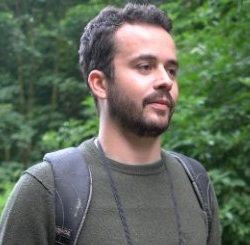
James M Booty
Email: J.Booty@uea.ac.uk | LinkedIn profile
Academic profile
I studied at the University of East Anglia gaining a BSc with First Class Honours in Environmental Sciences, graduating in 2012/13. My dissertation explored the potential for using artificial novel habitats as mitigation for the loss rocky intertidal coastline in the UK. This was done in a practical sense; designing and installing compensatory habitat on existing sea defences and monitoring their success.
Since then I have worked full time as a consultant ecologist, working towards a specialism in ornithology, though undertaking a wide range of ecological surveys and designing site specific mitigation and enhancement strategies.
My research interests are broad, spanning from habitat creation and mitigation to intertidal sedimentology, and usually with a focus upon effects on community ecology and biodiversity. A passion for birdlife, as well as most elements of british fauna, has always driven my passion for expanding human knowledge with the aim of conservation.
In a voluntary capacity I have assisted with two PhD projects, both based at the UEA. These were exploring the influence of macrofauna on intertidal sediment stability and biogeochemical properties and the macroecological distribution of avian functional diversity.
Current research
My current research is into the effects of wading birds upon the sediment stability of intertidal mudflats. This explores trophic cascade effects caused by predation upon macrofauna, and subsequent erosion properties of sediment due to altered grazing pressure upon biofilms. Direct effects of bioturbation are also investigated.
The stability of these environments is important for the ecosystem services which they provide, including coastal protection by flood control and carbon sequestration within sediments. It has been suggested that foraging effects may significantly influence sediment stability and flow (Daborn et al, 1993). My research intends to build upon such theories using methods of which no evidence has been found within the UK to date; measuring nutrient fluxes, productivity and sediment cohesion within in-situ plots both exclosed from and exposed to bird activity.
Research group
Supervisory team: Dr Trevor Tolhurst (UEA), Dr Richard Davies (UEA), Prof Graham Underwood (Essex University).
Marine Knowledge Exchange Network

Jessica Fisher
Durrell Institute for Conservation and Ecology, University of KentEmail: jcf22@kent.ac.uk
Jessica Fisher
Email: jcf22@kent.ac.uk
OrciD 0000-0002-1435-9247 | @Jessjessfisher | LinkedIn
Profile
After an undergraduate in Zoology (Newcastle University), and a Masters by Research in Biodiversity, Evolution, and Conservation (University College London), I was awarded a cross-disciplinary PhD at DICE, University of Kent, in Biodiversity Management.
Previous expedition research surrounds multidisciplinary themes in conservation and human impacts: how disturbance impacts iguana behaviour and variations in public attitudes toward iguanas (US Virgin Islands); and the impact of logging on lemur distribution and patterns of resource use (Madagascar). During my MRes, I conducted two research projects on species distribution modelling of loris populations in Southeast Asia, and the impacts of otter trawling on benthic biodiversity in western Greenland (partnered with ZSL).
I have worked in conservation charities including the ZSL Institute of Zoology (researching kelp monitoring and remote sensing), UN Environment Programme World Conservation Monitoring Centre (researching policy initiatives that support connectivity-conservation), and the Science Media Centre (assisting the press office as an intern).
PhD: Benefits of Biodiversity: Human-Nature Interactions in Urban Guyana
Urbanisation is presenting challenges for biodiversity conservation and human welfare. The gap between people and nature is increasing, possibly resulting in reduced interest and engagement with the environment. Yet, evidence is accumulating that demonstrates the societal and personal wellbeing and health benefits that people derive from exposure to nature. Research in this area is rarely conducted in tropical developing countries. My PhD project will be based in Georgetown, Guyana, a biodiverse concrete jungle laced with greenspaces and canal networks. I will be using multidisciplinary methods, supported by both the ESRC and NERC, to investigate Georgetown’s biodiversity and how it is perceived and valued. The results will be used by Guyana's Protected Areas Commission, in conjunction with WWF, to directly inform policy initiatives aimed at improving green/blue space provision for Georgetown residents.
Publications
- Yesson, C., Fisher, J., Gorham, T., et al. (2016) The impact of trawling on the epibenthic megafauna of the West Greenland shelf. ICES Journal of Marine Science (In review)
- Fisher, J., Blow, R., Wintersgill, D.M., Wood, S. (2016) Using animal behaviour and social science to study the impact of human presence on Iguana iguana, St Thomas, US Virgin Islands. Herpetological Conservation and Biology (In prep.)
- Blow, B., Fisher, J., et al. (2014) Abundance of five nocturnal lemur species and the influence of habitat characteristics in the littoral forest of Tampolo North East Madagascar. Lemur News 18:52-57
Awards
- Master’s Prize Scholarship - £2000 (UCL, 2014)
- Environmental Champion Of The Year – Shortlisted (NCL+ Awards, 2013)
- Research Scholarships and Expeditions Award - £3000 (Newcastle University, 2012)
Grants
- Grant - £1600 (St Clement Danes Educational Foundation, 2014)
- Grant - £1000 (Sir Mark and Lady Turner Charitable Settlement, 2014)
- Grant - £300 (Yorkshire Ladies’ Council of Education, 2014)
- Grant - £1000 (Hornsey Parochial Educational Charity, 2014)
- Somerset Special Award - £250 (Tottenham Grammar Foundation, 2014)
- Expedition Grant - £1000 (Gilchrist Educational Trust, 2013)
- Geographical Fieldwork Grant - £1500 (Royal Geographical Society, 2013)
Conferences
- Autumn 2014 (Poster and Talk) – Biological Sciences Panel Member, expedition logistics and planning. Explore, Royal Geographical Society with IBG, London
- Autumn 2014 (Talk) – Reflections from The Dark: The hunt for Madagascar’s nocturnal lemurs – Daytime Event, Anglo-Malagasy Society, London
- Spring 2014 (Talk) – Reflections from The Dark: The hunt for Madagascar’s nocturnal lemurs – Geographical Journeys: Microlecture Series, Ontaadje Theatre, Royal Geographical Society with IBG, London
- Autumn 2012 (Poster and Talk) – Human impacts on the Green Iguana – Biological Sciences Panel, Explore, Royal Geographical Society with IBG, London
- Autumn 2012 (Talk) - Human impacts on the Green Iguana – Public Lecture Series, Herschel Lecture Theatre, Newcastle University, Newcastle Upon Tyne.
Affiliations
- Durrell Institute of Conservation and Ecology (DICE), University of Kent
- Politics, Development and Sustainability Group, Royal Holloway University of London
- Protected Areas Commission, Government of Guyana
- WWF Guyana
Other activities
2016 – Research Blog Contributor (WomenAreBoring)
2015 – Student-Staff committee representative (University College London)
2015 – Soapbox Science – Volunteer assisting public engagement of research on Southbank
2015 – Sunset Safari – Stall informing the public about oceans research (ZSL)
2014 – Butterflies Volunteer informing the public about wildlife (Natural History Museum)
2014 – STEM Ambassador (STEMNET)
2013/14 – Blog Author (Noah’s Ark)
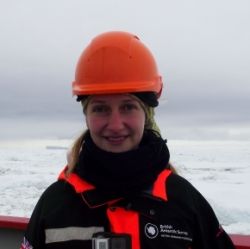
Jessie Gardner
Email: Jessie.Gardner@uea.ac.uk
OrcID: 0000-0003-1730-023X
Profile
I am fascinated by ecological responses in the face of environmental change. My research interests are interdisciplinary, ranging from sedimentology and geology to parasitology and oceanography. I strive to integrate numerous fields and perspectives for a more holistic approach to natural research.
I completed an integrated Master’s in Natural Sciences at the University of East Anglia (UEA) in 2014 with first class honours. My Master’s dissertation investigated small scale habitat selection by U.K. insectivorous bats within an agricultural region under Dr Iain Barr. This was part-funded by Conservation Grade and was in collaboration with Pensthorpe Natural Park and the Norfolk Barbastelle Study Group. I am experienced with radio-tracking and acoustic identification of bats using a range of equipment. This has allowed me to map species abundances using a geographical information system to indicate which habitats are valuable to these elusive organisms.
During my academic career, I have been enthusiastic in designing and taking part in outreach activities. These have included extensive work in setting up the UEA wildlife trails and nature walks for the general public and school groups. Additionally I have run and taken part in workshops based on aquatic bio-indicators, moth trapping, agricultural soils and skills for Uni.
Current research
Despite its isolation from the human world, Antarctica is experiencing rapid environmental change as a result of fossil fuel emissions. The impact of these changes remains relatively unknown, especially for pteropods. Pteropods are planktonic gastropods that swim through the surface ocean using wing-like structures. Their thin shells, made of aragonite, make them extremely sensitive to ocean acidification and they could perhaps be thought of as ‘canaries of the coal mine’ for detecting oceanic change. They are also vital to the Antarctic food web and are significant contributors to carbon export. I aim to carry out a comparative analysis of Antarctic pteropod distribution, life cycle and perhaps even existence within a high CO2 world. I will take part on several expeditions to the Southern Ocean to capture these fragile sea snails and examine their sensitivity to oceanic conditions predicted in 100 years. In addition, I will compare modern day pteropods to historic plankton net samples, including those collected in the 1930s by the RSS Discovery.
This PhD is a collaboration between the University of East Anglia and the British Antarctic Survey (BAS) as part of the EnvEast Doctoral Training Partnership, which is funded by the Natural Environmental Research Council (NERC).
Awards
- Faculty of Science prize for distinguished performance in the Final Assessment (University of East Anglia, 2014)
- Four UEA Open Scholarships, University of East Anglia 2010-14
- Gold volunteering award for exceptional contributions
- UEA Eliahou Dangoor Scholarship, University of East Anglia 2010
- Bruce Halsey prize foundation scholar for the highest A-Level results (East Norfolk Sixth Form College, 2011)
Conferences
- Jul. 2015 Climate research: ‘Big Data Day’, (Tyndall centre/University of East Anglia, Attended)
- Jul. 2015 CEFAS MKEN ‘Marine evidence conference’ (University of East Anglia, Attended)
- Jun. 2015 ‘The survival of pteropod larvae in a changing world’ International pteropod workshop, (British Antarctic survey, poster)
- Jun. 2015 ‘Ocean Acidification: What’s it all about’ (The Royal Society, Attended)
- Mar. 2015 ‘Sea butterflies’ EnvExpo, University of East Anglia (University of East Anglia, Infographic poster)
- Mar. 2015 ‘MSL AGM and Planktic Gastropod Meeting’ (Natural History Museum, Attended)
- Mar. 2014 ‘Microhabitat use of Soprano pipstrelles’ Annual Norfolk Barbastelle study group meeting (Invited speaker)
Courses
- Introduction to Metabolomics for Environmental Scientists (NERC advanced training course, University of Birmingham)
- Freshwater bio-assessment and its application in catchment management (NERC advanced training course, University of Stirling)
- Advanced environmental data analysis using GIS (NERC advanced training course, University of Newcastle)
- Infographics and Science communication (University of East Anglia/MADE)
- Introduction to Multivariate Statistics (NERC advanced training course, University of Oxford)
- An introduction to R (University of Kent)
- Public engagement training (NERC advanced training course, Stirling)
- Spatial analysis of ecological data using R (PR Statistics, University of Glasgow)
- Seagliders and Ocean Acoustics (University of East Anglia)
- THINKBig innovation training (Hethal, British Antarctic Survey)
- Wildlife film making for conservation filming (Thetford, Wildeye)
- Bioimaging (University of East Anglia)
- EnvEast Summer School (University of East Anglia)
- EnvEast Summer Workshop (Flatford Mill, University of East Anglia)
- Health and Safety in Science (University of East Anglia)
- Fire and Safety Training (British Antarctic Survey)
Research groups
- Centre for Ocean and Atmospheric Sciences (COAS), School of Environmental sciences, University of East Anglia
- Ecosystems programme, British Antarctic survey
Supervisory team
Primary supervisor: Dr Clara Manno (BAS)
Other supervisors: Dr Dorothee Bakker (UEA), Dr Geraint Tarling (BAS), Dr Victoria Peck (BAS)
Other activities
- Treasurer (formerly president) of the E3i innovation club
- Project co-ordinator of two team biochemical research cruises in Oban
- Former Conferences assistant at the University of East Anglia
- Moth trapping and recording
- Amateur wildlife photographer
- Company owner: ‘Jessie’s Jewels’

Joshua Jones
Email: Joshua.N.Jones@uea.ac.uk
Profile
In 2016 I completed a BSc in Geophysics with Geology at Durham University. This introduced me to the fundamentals of earth sciences and gave me experience in conducting near-surface geophysical surveying. After completing my BSc I decided to begin an MSc in Risk at the Durham University Institute of Hazard, Risk and Resilience. This change in direction was largely a result of time spent volunteering in Nepal after the 2015 Gorkha earthquake. My time in Nepal really opened my eyes to the catastrophic consequences of natural hazards, and motivated me to focus my research on natural hazards and disaster management. The MSc course gave me a thorough understanding of the physical processes associated with natural hazards such as earthquakes, tsunamis, landslides, typhoons and floods, as well an appreciation of how effective hazard mitigation requires stakeholder involvement and communication. The course culminated in a dissertation project on the control factors of coseismic and storm-triggered landslide distributions in the Gansu Province of northwest China. This involved creating multiple landslide inventories using remote sensing techniques, before quantifying the spatial-temporal distributions of those landslides within a GIS. This project cemented my passion for better understanding natural hazards for the purpose of improving disaster-risk management, and motivated me to continue higher level research in this field through my PhD project.
Current Research
The working title of my PhD is “Landsliding in Nepal: exploring the role of earthquakes, rivers and roads”.
The main aim of the project is to quantify the effect of earthquake-preconditioning in the Nepal Himalaya, and how this might be moderated by other geomorphological, climatic and human processes. Earthquake-preconditioning can be understood as the non-linear accumulation of brittle damage in hillslopes over multiple episodes of seismicity, and the consequent increases in hillslope susceptibility to future mass-movements. If earthquake-preconditioning is occurring, it is fair to hypothesis that rates of landslide occurrence will increase following large magnitude earthquakes under otherwise uniform conditions. This hypothesis has been tentatively supported by landslide observations in New Zealand, China and Taiwan, but remains largely unquantified and poorly understood. This PhD aims to test the earthquake-preconditioning hypothesis in the Nepal Himalaya, with a view to quantifying its impact such that it can be incorporated into statistical and deterministic models of hillslope stability that are used to predict future landslide occurrence. This will result in improved, time-dependent, landslide susceptibility maps, which will increase our understanding of the controls on landslide hazard, as well as providing a vital resource to hazard assessors across Nepal. This is a collaborative project between the University of East Anglia, the University of Plymouth, and AECOM engineering.
Conferences
Centre for Research in Earth Sciences (CRES) Conference 2017, 22/11/2017: Using the spatial distributions of past landslides to predict future failures, Tianshui City, China.
Geology for Global Development Annual conference, 4/11/2017: The impact of landsides on the sustainable development of Tianshui City, China.
St Chads College Research Forum, 4/05/2017: Can the past be used to predict the future? Assessing the temporal distributions of earthquake-triggered tsunamis in Chile.
Supervisory Team
Main Supervisor: Dr. Sarah J. Boulton (Plymouth University)
Secondary Supervisor: Dr. Georgina Bennett (University East Anglia)
Secondary Supervisor: Dr Michael Whitworth (AECOM)
Secondary Supervisor: Dr Martin Stokes (Plymouth University)
Memberships
Fellow of the Geological Society
Postgraduate Fellow of the British Society for Geomorphology
Volunteer for the UK disaster-relief charity Shelterbox
Member of the UK charity Geology for Global Development
Teaching
I demonstrate on the following modules at Plymouth University
GEOL1003: Geosystems
GEOL1005: Geological Maps and Structural Geology
GEOL2003: Geospatial Techniques
GEOL3010: Engineering Geology

Karina Adcock
School of Environmental Sciences, University of East AngliaEmail: Karina.Adcock@uea.ac.uk
Karina Adcock
Email: Karina.Adcock@uea.ac.uk
Qualifications
MSci in Environmental Sciences (University of East Anglia)
Master’s project: diurnal cycles of ozone and nocturnal ozone events
PhD title: New threats to the ozone layer: Exploring ozone-depleting substances in the upper troposphere and stratosphere
The destruction of the ozone layer has been a problem for many decades now. It is however not only an ongoing problem, but of renewed concern for a number of reasons. The concentrations of previously undetected ozone-depleting substances and ozone-depleting substances that are not controlled by international treaties are increasing. Of particular interest here are the rapidly developing economies of many countries in South and East Asia. Another major concern is changes to transport patterns within the stratosphere, which are hard to track. The recently discovered isotopic ‘fingerprints’ of ODSs in the stratosphere could provide new insights to such transport changes. The project involves using gas chromatography-mass spectrometry to investigate ozone depleting substances and their isotopes from air samples from a variety of sources. To improve understanding of ozone depleting substances and their past and future impact on the ozone layer.
Main supervisor: Dr Johannes Laube, Centre for Ocean and Atmospheric Sciences, School of Environmental Sciences, UEA

Kate Allberry
Email: Kpa9@kent.ac.uk
Profile
Since a young age, I have been fascinated by endangered species, felines, and our relationship with the natural world. I completed my undergraduate degree in Conservation Biology at Bournemouth University. During this time, I embarked on my first conservation volunteer trip to Thailand, which cemented my research interests in southeast Asia; my dissertation investigated the impact of tiger and bear farming in Thailand on the trade in Traditional Chinese Medicine.
After a short stint in ecological consultancy, I studied for my Masters in Wildlife Biology, receiving a grade of distinction. For my research project, I conducted a survey of carnivores in the Langeberg Mountains in South Africa, investigating differences in species presence (focusing on felines) with habitat type and weather patterns. Following my Masters, I wanted to develop my experience in southeast Asia, and spent six months with WWF Malaysia. During this time, I travelled extensively with the tiger team, learning about field survey techniques in the Belum-Temengor Forest Complex, and occupancy and habitat suitability assessment methods.
I spent four very happy years as Development Officer for Scotland with The Woodland Trust, until I was finally ready for PhD life. Over the last two years, I have been developing my research ideas, whilst gaining experience in conservation genetics, and building the partnerships and collaborations required for a successful project.
Current Research
‘How is environmental change influencing the movement of Malaysia's apex predators in wildlife corridors?’
Widespread habitat fragmentation is occurring across human-dominated landscapes in Southeast Asia. It is crucial to understand how rapid environmental change is affecting population connectivity and ensure there is sufficient gene flow, particularly between isolated populations of wide-ranging, low-density and often endangered large carnivores. To date, there has been limited genetic sampling in and around key habitat linkages in Peninsular Malaysia, leaving a gap in understanding of the extent of genetic connectivity and long-term likelihood of survival of its big cats.
This study will assess gene flow and the impacts of environmental change on population connectivity, focusing on three threatened large carnivores: the Indochinese leopard (Panthera pardus delacouri), Clouded leopard (Neofelis nebulosa) and Malayan tiger (Panthera tigris jacksoni). Genetic information will be collected primarily from feacal samples, and combined with climate and landscape data to forecast how populations may respond under a range of scenarios in the face of future change. This will also inform the potential restoration or creation of connectivity between fragmented habitats, and support the delivery of key national legislation, including The National Tiger Action Plan and The Central Forest Spine Master Plan for Ecological Linkages in Peninsular Malaysia.
The project will involve a new collaboration between the Durrell Institute of Conservation and Ecology (DICE), TRACE Wildlife Forensics Network, and partners in Peninsular Malaysia.
Publications
Allberry, K. (2017). The Human Face of Conservation: what we can all learn from the Sundarbans, Dhaka Courier, 34 (7), 17-19.
Rofes, J., Herman, J., and Allberry, K. (2017). Post-glacial recolonization and Holocene diversification of crocidura suaveolens (mammalia, soricidae) on the northwest fringe of the European continent (under review)
Awards
Wildlife Biology Masters programme award for academic excellence.
Grants
£1,500 - The Genetics Society
£1,000 - Lillingstone Trust (PhD travel grant)
£1,000 - The Wiltshire Community Foundation Shuker Scholarship (MSc study grant)
Research groups
DICE Conservation Genetics Research Team
Supervisory team
Other relevant activities
2017: Ambassador for WildTeam.
2017: Guest speaker: WildHour: woman power for a liveable earth (Noazesh Knowledge Centre, Dhaka)
2016: Phylogenetics study of Crocidura shrews (National Museum of Scotland Vertebrate Biology Team)
2015: Conservation genetics trainee (Royal Zoological Society for Scotland)
2014 & 2015: Guest speaker: BSc and MSc natural science programmes (Edinburgh Napier University)
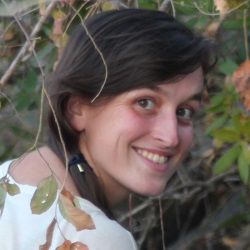
Katharine (Kate) Rogerson
School of Environmental Sciences, University of East AngliaEmail: katharine.rogerson@uea.ac.uk
Katharine (Kate) Rogerson
Email: katharine.rogerson@uea.ac.uk
Profile
2010 – 2013 BSc Biology at University of Bristol
2013-2015 Masters by Research at University of Bristol: The effect of anthropogenic noise on the alarm-call behaviour of dwarf mongooses (Helogale parvula)
Current research
In response to recent global environmental change, animal migratory patterns are being altered and previously wholly migratory species, such as white storks (Ciconia ciconia), that wintered in Sub-Saharan Africa now have resident populations in Southern Europe. This project takes advantage of state-of-the-art GPS/GSM loggers and the closure of land fill sites (which offer a winter food source), to unravel some of the mechanisms underlying bird migratory behaviour. Objectives include: identifying the determinant of migratory behaviour in storks, determining the demographic consequences of migration and residency and determining the population consequences of demographic changes and residents in response to future environmental changes.
Conferences
Previously attended conferences:
British Ecological Society AGM December 2012
INTECOL August 2013
Association for Study of Animal Behaviour (ASAB) winter conference 2013 (presented poster with preliminary results of masters thesis)
ASAB Summer conference 2014
ASAB winter conference 2014
Other relevant activities
I have previously been press office intern at the British Ecological Society in the run up to the INTECOL conference in London and recently been communications intern at the Bat Conservation Trust.

Kevin J Purves
Email: kep@pml.ac.uk
Profile
My undergraduate thesis was entitled: ‘Assessing the Influence of Biogeography on Actinomycete Secondary Metabolite Production Using Comparative Metabolomics’, which involved using soil samples from varying depths around Scotland and Antarctica to investigate the metabolites produced by the bacteria that was isolated using various techniques. I had a couple of months of lab experience during Summer 2014, in which I set up the bacterial library used for my thesis, and additionally by other researchers of the Microbiology Department at the Scottish Association for Marine Science.
Current research
Investigating the role of viruses in methanol production in the ocean.
Publications
Assessing the Influence of Biogeography on Actinomycete Secondary Metabolite Production Using Comparative Metabolomics – In Press
Conferences
SAGB General Meeting 2015
Primary supervisor
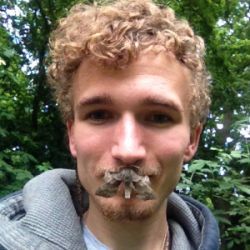
Kris Sales
Email: K.Sales@uea.ac.uk
ResearchGate profile | OrcID: 0000-0002-7568-2507
Current position
2014-onwards PhD student, University of East Anglia: "How do heatwaves impact male reproductive fitness in insects?"
Primary supervisor: Prof Matt Gage
Co-supervisors: Dr Aldina Franco, Dr Ramakrishnan Vasudeva
Research groups
- The Gage Laboratory
- Organisms and the Environment research theme, School of Biological Sciences, UEA
- Centre for Ecology, Evolution and Conservation, UEA
Current research
Impact of heatwaves on insect reproductive fitness
Evidence shows that natural populations are responding to climate change by shifting their distributions, phenology and morphology. Range retractions are particularly concerning as they can lead to inbreeding depression and extinction. However, our understanding of the proximate mechanisms is quite limited. My project explores one potential driver; the impact of heatwave conditions, predicted to become more extreme and frequent in the future, on reproduction in insects. It is well known that male-specific sensitivity to heat stress constrains reproduction in endotherms. However, despite ectotherms having greater abundance and sensitivity to temperature fluctuation little research has been directed at their fertility. My project aims to identify what male reproductive traits are damaged by heatwaves, whether adaption or recovery is possible and if transgenerational effects are induced. My experimental approach is to assess reproductive fitness and sperm form/function using large replicated populations of the Red Flour Beetle, Tribolium castaneum. However, future plans aim to incorporate Lepidopteran models such as Speckled Wood, Green-veined White or Scotch Argus Butterflies and Indian Meal Moths.
Sexual selection and mate recognition
Male-male same sex behaviour has been demonstrated in >100 Arthropods. Its prevalence is counter-intuitive as it confers the costs of sex (energy, time, vulnerability, disease, damage) but the direct benefit of offspring production is negligible. Many potential hypotheses exist broadly separated into adaptive strategies for intra-specific competition and bonding and maladaptive errors in recognising females. Previous studies investigated explanations however, often results are inconclusive, anecdotal or indirectly compare mate choice in assays of single sexes. We explore the impact of sexual selection, through evolved regimes of differing sex ratios, on the mate recognition behaviour of males in assays presenting pairs of mating targets.
Education
2010-14: MNatSci Natural Sciences with Integrated Masters, University of East Anglia; First Class (74%).
Publications
2016: Sales, K. Kerr, L., Gardner, J. 2016. Factors influencing epiphytic moss and lichen distribution within Killarney National Park. Bioscience Horizons 9:hzw008. DOI: 10.1093/biohorizons/hzw008
Conferences
2017
- Poster Association for the Study of Animal Behaviour Easter Meeting
- Speaker Centre of Ecology, Evolution and Conservation (CEEC) Rebellion Conference
- Speaker Royal Entomological Society Postgraduate Forum (RES) 2nd Talk Prize
2016
- Speaker University of East Anglia Postgraduate Forum
- Speaker Cambridge-EnvEast Doctoral Alliance Symposium
- Organising committee CEEC Rebellion Conference
- Attended Assessing Vulnerability of Biodiversity to Climate Change
- Attended War and Peace the Dynamics of Evolutionary Conflict
2013
Grants and awards
2017
- Association for the Study of Animal Behaviour Easter Meeting Travel Grant
- Royal Entomological Society (RES) Postgraduate Forum 2nd Talk Prize
- RES Travel Grant
2014
- Special Award for Outstanding Contribution to University Sport
- Bronze medal Norfolk Fencing Open
2013
- ASAB Undergraduate Project Scholarship
2011
- Chris Lelliott Memorial Prize for Field Ecology
2010-14
- UEA Eliahou Dangoor Scholarship
- Four UEA Open Scholarships
Teaching
2015 (onwards)
- Field ecology: residential demonstrator, driver and woodlands habitat leader for 2 week field trip to Inch, County Kerry, Ireland. Marker for lepidopteran taxonomic collections
- Environmental sciences skills: demonstrator
2014 (onwards)
- Behavioural ecology: demonstrator, marking presentations and scripts
- Maths and statistics for biologists: demonstrator
- Biodiversity: demonstrator and seminar leader
- Evolution, behaviour and ecology: demonstrator and seminar leader
Outreach
2014 (onwards)
- ENVEast E3I Student Innovation Club: Committee member
- Bringing Scientists to You: designed behavioural ecology games workshop and trained demonstrators. Run annually over 2 days with ~12 KS3 classes.
- ENVEast blog: written several blog posts
2012
- UEA: designed wildlife trail tours from KS2 to general public, trained guides and wrote biodiversity webpages
- Move on up: designed freshwater ecology investigation workshop for KS4
- Art and Biodiversity Summer School: designed workshop linking art, moth trapping and colouration KS3
- Science, Art and Writing: volunteered for soil stand at Norfolk Show from KS1 to general public
- British Academy Fencing: level 1 foil coach; British Fencing Association, Level 1 epee coach and level 1 foil/epee referee.
Societies
- The Linnean Society of London
- The Association for the Study of Animal Behaviour
- Royal Entomological Society
- British Ecological Society
General research interests
Coming from a natural sciences background, where nearly any module in the science faculty could be studied, I have a broad range of interests. However, I quickly realised when progressing though my degree that I have a real passion for how selection shapes morphology, behaviour and lifespan. Some especially interesting scenarios arise when parasites or sexual competition are involved. Although I have a soft spot for mammals groups like Primates and Chiropterans, invertebrates are fascinating because they are so diverse and ubiquitous. I regularly try and improve identification skills of Lepidoptera and Hymenoptera.

Laurie Kerr
Email: L.Kerr@uea.ac.uk
Profile
I graduated from UEA with a BSc (hons) in Ecology with a Year in Europe (spent at the Institut de Géographie Alpine in Grenoble, France) in 2014. My undergraduate dissertation investigated ‘the effects of urban park characteristics on insect community composition’, and sparked an interest in, and understanding of, the role of nature in the city. In 2017, I completed a Master’s degree in Environment and Society Studies, with a specialisation in Local Environmental Change and Sustainable Cities, at Radboud University in the Netherlands. This interdisciplinary Master’s degree helped develop my understanding of the necessity of socio – technical transitions towards a sustainable and low-carbon society, and I gained an appreciation of integrating both natural science and social science perspectives. My Master’s thesis investigated the role of guiding visions in the development of green infrastructure in two European Green Capital Award winning cities, as examples of best practices.
Current Research
'The potential of consumer facing, smart city technologies to reduce greenhouse gas emissions'
My PhD forms part of a wider project investigating digitally-enabled consumer innovations which can potentially reduce greenhouse gas emissions if adopted at scale.
In particular, I aim to explore the concept of ‘Smart Cities’, where a smart city is defined as a city where information technology is used to address a problem; in this case the problem of greenhouse gas emissions.
The next steps will be identifying consumer – facing innovations herein, determining how people interact with these innovations, and exploring what this could potentially mean for greenhouse gas emissions. Next, the key questions asking: Who are the early adopters? What value propositions do they gain from engaging with this innovation? What is the diffusion process from these early adopter groups to the wider population? will be explored, with a view to understand how these disruptive innovations at the fringes of the mass market can be mainstreamed, potentially reducing greenhouse gas emissions.
Publications
2016: Sales, K. Kerr, L., Gardner, J. 2016. Factors influencing epiphytic moss and lichen distribution within Killarney National Park. Bioscience Horizons 9:hzw008. DOI: 10.1093/biohorizons/hzw008
Supervisory team and Research Group
Supervisor: Dr Charlie Wilson

Lorna M Blackmore
Email: L.Blackmore@uea.ac.uk
OrcID | ResearchGate | LinkedIn
Profile
Having always been fascinated by insects much of my work has been inspired by the ecology of insects and their interactions with plants. I studied Conservation Biology and Management BSc at the University of Stirling where my dissertation project focused on pollinator use of urban wildflower strips. I was awarded a competitive research grant to take part in research investigating urban woodland moth and bat assemblages and how these are affected by different woodland characteristics. The results of each of these projects have now been published.
Since then I have completed an Ecology and Environmental Sustainability MSc at the University of Aberdeen. During which I worked with the James Hutton Institute on pollinator preference to different strawberry floral rewards and how these are affected by different community infections of mycorrhizal fungi. I enjoy the complexity of the interactions between plants and insects, particularly in regards to pollination, and I am keen to tease apart the factors which influence pollinator behaviour and evolution.
Current Research
Effects of farmland management on functional traits and pollination ecology of bee and hoverfly assemblages
With the widespread intensification of agriculture, a key concern has been the decline in abundance and diversity of insect pollinators and their associated pollination services. This has stimulated a range of farmland management interventions within agri-environment schemes both in the UK and elsewhere. Yet the benefits of one intervention over another, for the structure and functioning of insect pollinator assemblages, is neither proven nor well understood.
My PhD project combines cutting-edge community and molecular ecology approaches to address this gap in knowledge for farmland bee and hoverfly assemblages. I’m working to assess the level of between- and within-species variation in key functional traits such as tongue length, across multiple farmland sites. The extent to which flower species specialism can be predicted from individual variation in such traits will be tested. This will be achieved using state-of-the-art molecular tools in pollen analysis. Since pollinator efficiency is partly a function of level of flower specialism of individual insects, we will test how the latter varies in relation to total pollinator niche width of species. Establishing the influence and efficacy of management interventions such as floristic enhancement on pollinator assemblage structure and functioning, is a major theme underpinning the work.
Publications
Blackmore, L.M. and Goulson, D. (2014) Evaluating the effectiveness of wildflower seed mixes for boosting floral diversity and bumblebee and hoverfly abundance in urban areas. Insect Conservation and Diversity. 7, 480-484.
Lintott, P.R. Bunnefeld, N. Fuentes-Montemayor, E. Minderman, J. Blackmore, L.M. Goulson, D. Park, K.J. (2014) Moth species richness, abundance and diversity in fragmented urban woodlands: implications for conservation and management strategies. Biodiversity and Conservation. 23, 2875-2901.
Awards
Butterfly Conservation's Outstanding Volunteer Award
The Young Scottish Green List Award
Grants
Nuffield Research Placement Grant
Conferences
Attended: The Royal Entomological Society’s Pollinator Meeting “Progress in Pollination and Pollinator Research” at the University of Reading. 2016.
Attended: Natural Sciences Collections Association’s annual conference. “Focus on how Natural Science Collections Inspire our Connection to the Natural World” at Derby Museum. 2016.
Supervisor
Primary supervisor: Dr Richard Davies
Other relevant activities
A keen volunteer of Butterfly Conservation and the RSPB I have regularly taken part in conservation work to restore habitat for a variety of species. I also enjoy taking an active role in public engagement events to help raise awareness of Lepidoptera species and their conservation. In the past I have worked with the Forth Naturalist and Historian journal to survey the distribution of declining and under-recorded butterfly species in the Stirlingshire area.
I have also been employed in Ecological Consultancy as an assistant consultant Ecologist and bat surveyor. More recently I have worked in the Entomology division at World Museum specialising in lesser known pollinators such as hoverflies and solitary bees. There I worked to promote pollinators to the public by increasing awareness of their diversity and importance whilst also giving wildlife gardening advice to help conserve them.
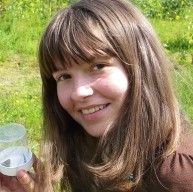
Lorna M Blackmore
Email: L.Blackmore@uea.ac.uk
OrcID | ResearchGate | LinkedIn
Profile
Having always been fascinated by insects much of my work has been inspired by the ecology of insects and their interactions with plants. I studied Conservation Biology and Management BSc at the University of Stirling where my dissertation project focused on pollinator use of urban wildflower strips. I was awarded a competitive research grant to take part in research investigating urban woodland moth and bat assemblages and how these are affected by different woodland characteristics. The results of each of these projects have now been published.
Since then I have completed an Ecology and Environmental Sustainability MSc at the University of Aberdeen. During which I worked with the James Hutton Institute on pollinator preference to different strawberry floral rewards and how these are affected by different community infections of mycorrhizal fungi. I enjoy the complexity of the interactions between plants and insects, particularly in regards to pollination, and I am keen to tease apart the factors which influence pollinator behaviour and evolution.
Current Research
Effects of farmland management on functional traits and pollination ecology of bee and hoverfly assemblages
With the widespread intensification of agriculture, a key concern has been the decline in abundance and diversity of insect pollinators and their associated pollination services. This has stimulated a range of farmland management interventions within agri-environment schemes both in the UK and elsewhere. Yet the benefits of one intervention over another, for the structure and functioning of insect pollinator assemblages, is neither proven nor well understood.
My PhD project combines cutting-edge community and molecular ecology approaches to address this gap in knowledge for farmland bee and hoverfly assemblages. I’m working to assess the level of between- and within-species variation in key functional traits such as tongue length, across multiple farmland sites. The extent to which flower species specialism can be predicted from individual variation in such traits will be tested. This will be achieved using state-of-the-art molecular tools in pollen analysis. Since pollinator efficiency is partly a function of level of flower specialism of individual insects, we will test how the latter varies in relation to total pollinator niche width of species. Establishing the influence and efficacy of management interventions such as floristic enhancement on pollinator assemblage structure and functioning, is a major theme underpinning the work.
Publications
Blackmore, L.M. and Goulson, D. (2014) Evaluating the effectiveness of wildflower seed mixes for boosting floral diversity and bumblebee and hoverfly abundance in urban areas. Insect Conservation and Diversity. 7, 480-484.
Lintott, P.R. Bunnefeld, N. Fuentes-Montemayor, E. Minderman, J. Blackmore, L.M. Goulson, D. Park, K.J. (2014) Moth species richness, abundance and diversity in fragmented urban woodlands: implications for conservation and management strategies. Biodiversity and Conservation. 23, 2875-2901.
Awards
Butterfly Conservation's Outstanding Volunteer Award
The Young Scottish Green List Award
Grants
Nuffield Research Placement Grant
Conferences
Attended: The Royal Entomological Society’s Pollinator Meeting “Progress in Pollination and Pollinator Research” at the University of Reading. 2016.
Attended: Natural Sciences Collections Association’s annual conference. “Focus on how Natural Science Collections Inspire our Connection to the Natural World” at Derby Museum. 2016.
Supervisor
Primary supervisor: Dr Richard Davies
Other relevant activities
A keen volunteer of Butterfly Conservation and the RSPB I have regularly taken part in conservation work to restore habitat for a variety of species. I also enjoy taking an active role in public engagement events to help raise awareness of Lepidoptera species and their conservation. In the past I have worked with the Forth Naturalist and Historian journal to survey the distribution of declining and under-recorded butterfly species in the Stirlingshire area.
I have also been employed in Ecological Consultancy as an assistant consultant Ecologist and bat surveyor. More recently I have worked in the Entomology division at World Museum specialising in lesser known pollinators such as hoverflies and solitary bees. There I worked to promote pollinators to the public by increasing awareness of their diversity and importance whilst also giving wildlife gardening advice to help conserve them.
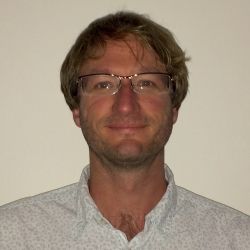
Mark Wilson
Email: Mark.Wilson@uea.ac.uk
Profile
For many years I have nurtured a passion for understanding our food system; how food is produced and transported to appear in our kitchens; its social and cultural importance; and how our relationship with nature is defined by the resource use and environmental impacts associated with production and consumption behaviour. My specific research interests include food systems analysis, community-led sustainability initiatives, environmental ethics, and ecological low-carbon forms of agriculture.
In 2013 I graduated from Uppsala University with an MSc in Sustainable Development, and in 2015 I completed an MSc in Agricultural Development from the University of Copenhagen. I coordinated a course entitled ‘Urban agriculture – permaculture and local food systems’ for 3 years at the Centre for Environment and Development Studies (CEMUS), Uppsala University.
Current Research
PhD Title: Consumer-facing, digital food-related innovations to reduce greenhouse gas emissions
The aim of this project is to identify and characterise innovations which can demonstrably reduce food-related GHG emissions and have the potential to be scaled up. The focus is on consumers and social initiatives, rather than farming practices or supply chains, in order to understand how user-centric innovations can reduce our climate impact.
The project focuses on digital innovations which aim to reduce food waste, encourage dietary change or facilitate local food networks. Features of the innovations which appeal to consumers are explored, such as the value propositions, attributes and business models. Finally, the diffusion processes are analysed to understand how these innovations spread from early adopters to wider social groups. Understanding the motivations and patterns of uptake will highlight possible leverage points for reducing food-related GHG emissions.
Conferences
IARU Sustainability Science Congress, University of Copenhagen 2014. Conference rapporteur.
ELLS Scientific Student Conference, BOKU Vienna 2013. Parallel session presentation: Defining an urban food policy - stakeholder perspectives of the urban food system in Bristol, UK
The Power of ESD Conference, Uppsala University 2012. Conference rapporteur.
Research group and Supervisor
Social Influence and disruptive Low Carbon Innovations (SILCI). Supervisor - Dr Charlie Wilson.
The Tyndall Centre for Climate Change Research, University of East Anglia, Norwich

Martina Bristow
Email: martina.bristow@uea.ac.uk
Profile
My academic interests span many fields such as: mathematics, wildlife conservation, animal behaviour, marine spatial planning, fisheries acoustics, and fisheries management. These interests have naturally led me to seek out an interdisciplinary PhD project that brings together my key interests, drawing upon both my biological and physical/mathematical background.
I completed an integrated Masters in Mathematics at the University of East Anglia (UEA) in 2010, focusing primarily on fluid dynamics during my Master’s year. Having realised my passion for animal behaviour, I later obtained an MSc in Animal Behaviour: Applications for Conservation at Anglia Ruskin University (ARU) in 2016. It was through my Master’s thesis project at the British Antarctic Survey (BAS) that I first became involved with the Commission for the Conservation of Antarctic Marine Living Resources (CCAMLR). My project looked at ways to identify important benthic areas for conservation in the Southern Ocean as part of a wider context of marine protected area planning by CCAMLR. During the course of my project, I began to appreciate the challenges inherent in producing robust assessments of marine ecosystems and the need for reliable methods, particularly for assessments of commercially and biologically important species.
Prior to commencing my PhD, I worked for the Norwegian Institute of Marine Research (IMR) in Bergen as a research technician for six months. I undertook a project to evaluate the Weddell Sea Marine Protected Area proposal tabled to CCAMLR in 2016 by the European Union. My employment with the IMR provided me with excellent opportunities to better understand Southern Ocean marine ecosystems and how they are currently monitored, as well as contribute science to inform international policy.
Current Research
Marine ecosystem assessment in a patchy world: are AUVs the solution to quantify zooplankton?
The distribution of zooplankton in the oceans can be highly patchy. Estimating their abundance is therefore challenging due to the difficulties in obtaining representative acoustic or biological samples. Although zooplankton have some limited ability to direct their movements, they are subject to strong influence from oceanographic conditions. By studying the relationship between these environmental factors and the propensity for zooplankton to become patchily distributed, this project aims to improve methods for quantifying zooplankton for the purposes of marine ecosystem assessment.
Autonomous Underwater Vehicles (AUVs) offer numerous potential advantages to do this, since they can collect data on in-situ oceanographic conditions simultaneously alongside acoustic information on zooplankton distribution. AUVs are capable of collecting data from areas inaccessible to ships and moorings, and can be considerably cheaper for running surveys. However, there are difficulties in obtaining usable data from AUVs such as ocean gliders, and this project will address the problem of how to optimally design glider surveys by analysing existing ship-based data in the context of modelled oceanographic conditions to develop sampling strategies. These strategies will then be tested by glider deployments on missions that run concurrently with ship-based surveys of zooplankton. I am also keen to explore whether zooplankton show a marked behavioural response to gliders, as it may be important to account for this effect if using glider data to estimate abundance.
This PhD is an Industrial CASE partnership between the University of East Anglia, the British Antarctic Survey, and the Centre for Environment, Fisheries and Aquaculture Science (Cefas), funded by the Natural Environmental Research Council.
Supervisory team
Primary supervisor: Professor Karen Heywood (UEA)
Co-supervisors: Sophie Fielding (BAS), Jeroen van der Kooij (Cefas)
Publications
CCAMLR working group and Scientific Committee working papers:
WG-EMM-16/35 (2016) Identification of important benthic areas for conservation – using shared data from the Domain 1 MPA planning process. Bristow, M., Grant, S., Santos, M., & Capurro, A.
WG-EMM-17/42 (2017) The Weddell Sea MPA revisited: questions, comments and suggestions. Bristow, M. and Godø, O. R.
SC-CAMLR-XXXVI/10 (2017) The Weddell Sea MPA revisited and wider implications for CCAMLR MPA planning. The Delegation of Norway (Authors: Bristow, M., Godø, O. R., Lowther, A., & Bergstad, O. A.)
Grants & Awards
EPSRC Vacation Bursary 2009.
NERC Industrial CASE Studentship 48 months, commencing 2017.
Other relevant activities
Various voluntary, outreach and teaching/demonstrating positions:
UEA (2007-2010): Mathematics Teaching Advisory Group Member and School Board Rep, Mathematics Peer Guide, MTH Sports Rep, Faculty of Science Visit Day Guide, Student Ambassador & Student Mentor;
ARU (2014-2016): Demonstrator for undergraduate Biomedical Sciences, Biology and BioGIS modules, Student Ambassador, and Outreach work e.g. facilitating Cambridge Science Festival events.
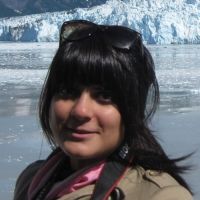
Natasha Senior
Email: N.Senior@uea.ac.uk
Profile
I have always been driven by an innate curiosity about the natural world, which underpins my interests in photography and travelling. Undoubtedly, this is what attracted me to studying for an integrated Master’s degree in theoretical physics at the University of Edinburgh.
But whilst I really enjoyed learning about the fundamentals of the universe, it all felt a bit far removed from the everyday world. I started to seek out more interdisciplinary fields of study. I spent one summer at Imperial College learning about the dynamics of microbubbles, which are used for imaging blood vessels, and my final year project involved using energy constraints to predict the existence of life in extreme environments. At the end of university I was keen to be involved in a project of both environmental and societal importance so I joined a team of seven volunteers to lead the EGP India 2013 project. We raised funds to build biogas converters for 20 impoverished families in South India.
Current research
These experiences led me to join the University of East Anglia (UEA) as part of the EnvEast DTP. I wanted to apply my knowledge of physics and be involved in something that I felt was worthwhile. The Antarctic Circumpolar Current is an important junction that connects major ocean currents; eddies that are formed here could potentially be mixing salinity, heat and other properties of the world’s oceans and redistributing them. Hence these processes could help to regulate the ocean and climate. Currently these phenomena are poorly understood and there are many conflicting opinions on how they manifest on a global scale. My project will use mathematical modelling of geophysical fluid dynamics in order to understand these eddy-mixing properties so that their effects can be better represented in climate models.

Netnapa Kaswiset
School of Environmental Sciences, University of East AngliaNetnapa Kaswiset
Email address: n.kaswiset@uea.ac.uk
Academic Profile
I completed my Undergraduate degree in Plant Science at Naresuan University. Following this I completed an MSc in Sustainable Land use and Natural Resource Management at Kasetsart University in Thailand, obtaining a distinction. My dissertation involved Effects of Organic and Chemical Fertilizers on Soil Properties, Yield and Economic Return in Sugarcane Production.
I also have experience in analysis of satellite imagery and aerial photographs for land use classification and economic crops identification, research on the application of satellite remote sensing, GIS and application software for land use classification, yield prediction as well as natural resources management.
PhD title: Agricultural Land-use Change Modelling for Land-use Planning in Thailand
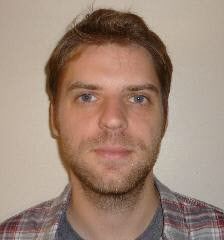
Nicholas Garrard
Email: n.garrard@uea.ac.uk
Twitter: @NGUEA2
OrcID: 0000-0003-3241-0381
Academic profile
BSc Environmental Sciences (UEA). Dissertation title: Partitioning of arsenic and copper in biochar-amended mining spoil.
MSc Climate Change (UEA). Dissertation title: Direct emissions of nitrous oxide emissions from soils: A comparison of two agricultural regimes
PhD, in progress (UEA). Project title: Dual stable isotope determination of nitrogen transformation in a lowland arable catchment under different agricultural regimes.
Research interests
My main research interests are in the fields of agronomy and hydrology, in particular the physiochemical influence of agricultural practices on the soil and groundwater/surface water environments.
The influence of both the hyporheic and riparian zones on nitrate transformation and attenuation is of great interest to me, as these potential zones of natural mitigation of surface and groundwater contamination. Research into this area could have an impact on the further propagation of catchment sensitive farming efforts, ultimately leading to more sustainable, environmentally sympathetic agriculture.
Current research
Based on the Wensum Demonstration Test Catchment (WDTC, Reepham, Norfolk), my PhD utilises the isotopic signature of nitrate found in groundwater and in the hyporheic zone to indicate the main processes affecting nitrogen transformations. The δ15NNO3 and δ18ONO3 values found in these sinks can aid in improving our understanding of biogeochemical cycling in arable settings and the response of these values (and indeed measured nitrate concentrations) to different agricultural practices (e.g. cover cropping, low till) can be a powerful tool in assessing the effectiveness of these alternative agricultural regimes.
Another part of my PhD will be extensive soil analyses, including cation and anion assessments as well as concentrations of organic and inorganic forms of nitrogen. This will allow for a whole catchment approach, through modelling, in understanding not only the impact of agricultural activities on the receptor (i.e. surface and groundwater), but also the behaviour of the internal stocks and flows of nitrogen throughout the catchment.
Research groups
Main supervisor: Prof Kevin Hiscock
Secondary Supervisor: Dr Alina Marca
Research Affiliation: River Wensum Demonstration Test Catchment Project, UEA
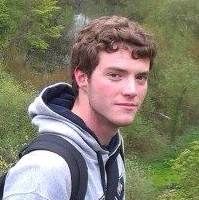
Philip D Lamb
School of Biological Sciences, University of East AngliaPhilip D Lamb
Email address: P.Lamb@uea.ac.uk
ORCiD: 0000-0003-3748-8241
Academic profile
I previously attended the University of Oxford for an MSc in Biodiversity, Conservation & Management, and the University of York for a BSc in Environmental Science. I have a very broad set of academic interests – although ecology and conservation biology are my key research areas. My previous research project, conducted for fulfilment of my MSc, was a long-term ecological study trying to elucidate relationships between mega-herbivores and vegetation in Highland Scotland during the Holocene.
Current research
The frequency of jellyfish blooms is increasing globally, resulting in adverse ecological, social and economic effects. Very few predators of adult jellyfish have been documented due to the difficulty in observing predation events underwater and the unsuitability of morphological gut contents analysis for identifying soft-bodied organisms. Furthermore, jellyfish are inconspicuous for large periods of their life cycle; nothing is known about predation on jellyfish during these life stages. My research involves identifying and quantifying predation of jellyfish that may exert top-down control over jellyfish populations. PCR-based assays targeting the 18s rDNA region will be used to identify jelly tissue in potential predators’ gut contents. These jellyfish tissues will then be identified down to the species level using next-generation sequencing techniques. This information will be used to update an existing ECOPATH model of the Irish Sea to better incorporate inter-species trophic relationships with jellyfish. Simulations under different jellyfish abundance scenarios will be used to investigate the impact of jellyfish blooms on commercially important fish species and the ecosystem as a whole. It is hoped that this elucidation of jellyfishes’ role in the ecosystem’s food web will result in practical applications for fisheries management by providing information to fisheries managers about biological methods for controlling jellyfish blooms.
Research groups
The Martin I Taylor Laboratory, School of Biological Sciences, University of East Anglia
Other activities
Creative Director, E3I EnvEast Enterprise and Innovation student club
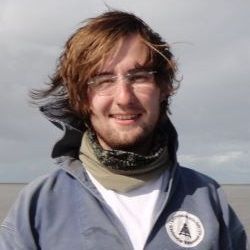
Philipp Siegel
Email: psiege@essex.ac.uk
Profile
I finished a B.Sc. in Biology with a focus on marine biology at the University of Bremen in 2013. In 2015 I completed a M.Sc. in Social-Ecological Resilience for Sustainable Development at the Stockholm Resilience Center. I have a strong research interest in whole system processes and how microbial communities are shaped by environmental changes and external stresses. I find it of utmost importance to understand how future changes will affect microbial communities since they form the basis of many ecosystems in the Anthropocene. I have experiences in field sampling (ecological monitoring and measurement of abiotic and biotic parameters), laboratory work (analysis of bacterial communities), and statistical analysis of community data.
In the future I would like to expand my research to better understand what role changes on the microbial community level play for the greater socio-ecological system they are a part of.
Current research
For my Ph.D. I will investigate how phytoplankton communities (assemblies of microscopic photosynthetic organisms such as algae and cyanobacteria) are shaped by multiple environmental stresses. These communities account for half of the world's produced oxygen and form the basis of many aquatic food webs by fixing carbon from CO2 and making it available to other organisms.
The research will be conducted both in the lab under controlled environmental conditions as well as in the field to gain a better understanding of natural community dynamics.
Understanding the role of multiple stresses on the dynamics of phytoplankton communities is important since environmental changes will become more extreme and frequent in the future and stress on aquatic ecosystems will only increase. Greater insights into phytoplankton community dynamics will allow improved ecosystem management and provide a better basis for environmental policy making.
Conferences
September 2015: International Symposium on Urban Ecology in Bogota, Colombia, which was organized by the Society for Urban Ecology (SURE) in collaboration with the Humboldt Institute Colombia.
Research group
Etienne Low-Decarie and Richard Geider, Environmental and Plant Research Group, University of Essex.
Other relevant activities
Together with my friend Fernando Remolina, with whom I studied at the Stockholm Resilience Center, I am currently in the process of founding a company which will aim at connecting communities from Colombia with sustainable energy companies and other sustainability science ideas from Europe. The aim is to alleviate poverty, improve human well-being and ensure sustainable ecosystems to foster socio-ecological resilience in a rapidly-changing world.

Phillip R K Pichon
Email: ppicho@essex.ac.uk
ORCiD: 0000-0003-0712-6274 | LinkedIn
Profile
My research interests lay within the field of microbiology, predominantly in the activities and interactions of microbes in the marine environment. My enthusiasm for this area of research was initially fuelled during my undergraduate degree in marine biology at the University of Portsmouth, which included my participation in a 3 month Erasmus work placement at the University of Santiago de Compostela, Spain. During this placement I became familiar with characterisation and identification techniques used for marine microbes, which subsequently provided an excellent basis for my dissertation topic; characterisation of bacterial isolates associated with the clam and scallop microbiota.
Having developed a keen interest in marine microbiology, I studied an MSc in Tropical Marine Biology at the University of Essex and was introduced to the importance of marine microbes in biogeochemical cycling. My master’s thesis investigated the production and degradation of isoprene, a biogenic volatile organic compound (BVOC), within the holobiont of scleractinian coral, and identified a previously unknown tropical isoprene sink term. Whilst studying isoprene degradation I became further interested in other volatile organic compounds (VOCs), their environmental impact, and the role of microbes in regulating their release to the atmosphere.
PhD title: Microbial Degradation of Acetaldehyde in Marine Environments
Marine environments represent the largest global source of the oxygenated, highly volatile organic compound, acetaldehyde, to the atmosphere ( 17-125 million tonnes per year). After entering the atmosphere, acetaldehyde takes part in a series of chemical reactions which alters the atmospheres oxidising capacity, consequently contributing to global warming. The extent of acetaldehyde atmospheric flux is limited by microbial activity; however, the identity and diversity of the microbes responsible for acetaldehyde degradation remain largely unknown.
As a result, the degradation pathway of acetaldehyde has yet to be elucidated. Furthermore, without an understanding of the abundance of microbes in marine environments able to utilise and degrade acetaldehyde, estimations of ocean emissions will continue to be broad and unreliable. Moreover, the impact of various environmental conditions on rates of acetaldehyde degradation has yet to be identified, and given the contribution of acetaldehyde to global warming, this impact could be significant in the near future.
Accordingly, this project aims to isolate, identify and characterise the microbes responsible for acetaldehyde degradation in the marine environment, using microcosm enrichment experiments coupled with high-throughput next generation sequencing (16S rRNA). Proteomic analysis will be used to identify the genes involved in acetaldehyde metabolism, whilst the abundance and diversity of acetaldehyde-degrading microbes in coastal waters will be determined by developing and applying primers for quantitative real-time PCR. The impact of environmental factors on degradation rates will also be established.
Publications
- Lasa, A., Pichon, P., Diéguez, A. L. & Romalde, J. L. (2016). Marinomonas gallaica sp. nov. and Marinomonas atlantica sp. nov., Isolated from Reared Clams (Ruditapes decussatus). International Journal of Systematic and Evolutionary Microbiology, 66, 3183-3188.
Awards
- University of Portsmouth Top Student Award (2014)
- University of Portsmouth Environmental Monitoring Unit Prize (2014)
Conferences
- Reef Conservation UK (RCUK) 2014
- Chagos Conservation Conference 2014
Attended Reef Conversation UK (RCUK) 2014 and the Chagos Conservation Conference 2014 at ZSL during my master’s degree in order to enhance my knowledge of coral reef ecology, network and communicate with researchers within the field, and to be exposed to cutting edge research associated with corals and the reef community. These conferences, particularly RCUK, were useful in supplementing my learning and provided valuable information which could be applied to my master’s thesis.
Supervisory team and research groups
- Dr. Terry McGenity - Environmental and Plant Bioscience Research Group (Ecology and Biogeochemistry)
- Dr. Boyd A McKew - Ecology and Environmental Microbiology Group
- Dr. Joanna L Dixon - Plymouth Marine Laboratory (PML)
- Prof. J Colin Murrell - Earth and Life Systems Alliance (ELSA) / University of East Anglia
Other relevant activities
Erasmus Placement - University of Santiago de Compostela, Spain. (2013) Volunteered to take part in a 3 month work placement at the University of Santiago de Compostela in order to advance my knowledge of bacterial characterisation and identification, expand my range of laboratory techniques associated with this type of work (e.g. 16S rRNA gene sequencing & phylogenetic analysis), whilst also gaining a better understanding of postgraduate work by collaborating with current PhD students. During my time at the university I was able to complete my third year project and assist my peers with their work; resulting in a publication.

Rebecca Mary Wright
School of Environmental Sciences, University of East AngliaRebecca Mary Wright
Email: Rebecca.Wright@uea.ac.uk
ORCiD: 0000-0003-2333-6247 | Twitter | ResearchGate
Profile
I studied Marine Biology with Oceanography (first class), followed by Master of Marine Science (first class) at Bangor University, North Wales. I am highly committed to environmental science, with a particular enthusiasm for marine biology, especially related to current and future threats from climate change. I am interested in how intrinsically physical conditions in the ocean are linked to the biology.
My Masters thesis title was ‘renewable energy structures as stepping-stones in the dispersal and connectivity of marine benthic organisms’. For my research, I incorporated proposed renewable energy sites and the larval spawning stage of a selection of marine benthic organisms into a physical oceanographic model of the Pentland Firth and Orkney Waters. The aim of the research was to assess the potential impact that increasing numbers of marine renewable energy structures would have on the dispersal of native and invasive organisms.
Current research
Impact of climate change on jellyfish occurrence.
There is much circumstantial evidence that jellyfish blooms are occurring more frequently in recent years, having negative impacts on tourism, aquaculture, fishing and coastal infrastructure (such as power plants). Jellyfish bloom in warm waters, dominating the local ecosystem for short periods of time (weeks). As the oceans warm under the influence of climate change, it is expected that jellyfish abundance will increase, but this interaction is complicated and poorly understood due to multiple interactions with the environment.
My PhD aims to quantify the role of climate change on the occurrence of jellyfish blooms in the oceans using a new database, observations and a global marine ecosystem model.
Awards
Deeming Summer Placement Award, 2013
Bangor University
Conferences
My master research poster was presented at the 2nd International Conference on Environmental Interactions of Marine Renewable Energy Technologies, 28th April to 2nd May 2014
Supervisory team
Prof Corinne Le Quéré, Tyndall Centre for Climate Change Research, UEA
Dr Erik Buitenhuis, School of Environmental Sciecnes, UEA
Dr Sophie Pitois, Cefas
Other activities
SEACAMS Research Cruise
I spent five days assisting on a physical oceanography research cruise with Bangor University and SEACAMS on the RV Prince Madog. Bottom mounted and ship deployed ADCP and multi-beam surveying were used to survey an area to investigate its suitability for a tidal-energy array.
Red Sea Environmental Centre
I volunteered for five weeks for an environmental centre in Dahab, Egypt, using scientific dives to survey coral reefs for the impacts of climate change, tourism and illegal fishing. During my time in Dahab, I initiated and led an environmental education day for local school children on the threats to the Red Sea, such as the illegal fishing carried out by many locals, why such impacts are such a threat and how they could help.
MARINElife Surveyor
I am a Surveyor for the UK charity MARINElife for whom I have carried out surveys of seabird, cetacean and marine mammal abundance and location, as well as assisting with data sets.

Reem Al Mealla
Email: rksalm@essex.ac.uk
LinkedIn | ResearchGate | Twitter
Profile
Reem Al Mealla is a nature lover by default, a marine biologist graduate and a climate advocate by concern. Following the completion of her BSc. in Marine & Freshwater Biology at the University of Essex, she went on to do her MSc. in Ecology, Evolution & Conservation at Imperial College London.
She gained her field experience through her work in Indonesia where she conducted her undergraduate dissertation on the behaviour of four species of butterfly fish in relation to reef quality in the Wakatobi Marine National Park and was awarded the Abel Imray Prize (joint) in 2010 from the University of Essex for this project. She then did her postgraduate thesis on investigating marine turtle nesting sites, local perceptions and conservation strategies in Northern Madagascar.
In Bahrain which is located in the Arabian Gulf, Reem has spent the past 5 years working in the environmental sector – some of her noteworthy accomplishments include serving as the National Project Manager for the Revision of the National Biodiversity Strategy and Action Plan (NBSAP) Project in addition to establishing the preliminary foundation for the Implementation of the Cartagena Protocol on Biosafety at a national level and Bahrain’s first online environmental platform – bnature.
Current Research
Accretional health of reefs in the Arabian Gulf and Indian Ocean
Coral reefs are the result of long term net calcium carbonate (CaCO3) accretion, which is a combined result of net CaCO3 by calcifying primary and secondary reef builders and destructive biophysical processes caused by bioeroders. Coral calcification is influenced by environmental conditions (e.g. temperature, depth and ocean acidification) and depends on symbiotic partnership between the coral and its dinoflagellate algae (Symbiodinium). When a coral encounters stress, the symbiosis breaks down thereby resulting in coral bleaching which impacts reef calcification in the short and long term. In order to effectively monitor reef health it is essential to determine the current status of reef environments and whether reef frameworks are actively accreting CaCO3 or being eroded away. Recent research has demonstrated that different clades and sub-clades of Symbiodinium spp. display varying tolerance to both heat and light stress. Symbiodinium thermophilum sp. nov. (clade C) a thermotolerant symbiotic algae, is prevalent in corals situated in the world's hottest sea, the Persian-Arabian Gulf (PAG), contradicting previous published results claiming that Clade D was dominant. Similarly regional studies across the Western Indian Ocean (WIO), indicate that Symbiodinium spp. of clade C are the most dominant. This study aims to determine accretional health in Bahrain (PAG) and the Seychelles (WIO) whilst investigating the cost-benefit of their coral’s symbionts during both stressed and non-stressed enviornmental conditions, as compared to global reference sites.
Awards
Abel-Imray Prize – Joint Award(2010)
Motivational, Empowering & Inspirational [M.E.I] Women Award (2017) from the University of Essex
Conferences
RCUK 2016
EnvExpo 2017 [Poster Presentation]
Research group(s)/Laboratories etc
Coral Lab - Coral Reef Research Unit – University of Essex
Primary Supervisor: Dr. Leanne Hepburn
Secondary Supervisor: Prof. David Smith
Other activities
Dissertation Project Leader – Indonesia Expedition (2017) – Operation Wallacea

Rhosanna Jenkins
Email: Rhosanna.Jenkins@uea.ac.uk | Twitter | LinkedIn
ORCiD: 0000-0001-7970-5262
Academic profile
Having completed a Bachelor’s degree in Geography in June 2013 and a Master’s degree in Risk and Environmental Hazards in September 2014 at Durham University, I moved to the University of East Anglia in October 2014 to start a research PhD in the School of Environmental Sciences.
Following work on modelling alterations to peak river flows with future climate changes at undergraduate level, and an assessment of the water-related risks associated with the River Gaunless, in collaboration with the Wear Rivers Trust and Environment Agency, at Master’s level, I now focus on climate change and hydrological modelling.
I am extremely interested in interdisciplinary approaches and human-environment interactions and feedbacks. A further interest is the presentation of science in the media and how potentially controversial topics can be best communicated to policymakers and members of the public.
Current research
My PhD research focuses on the Tana River Basin, Kenya’s largest river basin, and examines how hydrology and biodiversity will be affected by climate change. Climate change presents an increasing challenge for human and environmental well-being and poses a serious threat to both water resources and biodiversity.
I use the Wallace Initiative database of projected species’ movements with climate warming to see how the biodiversity of the Tana Basin will be affected by climate change and a hydrological model to determine changes in water resources and the implications of land management strategies, to see where biodiversity and human development come into conflict.
Eastern Africa is in urgent need of scientific evidence and modelling tools to facilitate decision making and in order to determine robust adaptation measures.
Awards
MADE Agency Award for Excellence in Infographics at the 2015 EnvEXPO
Conferences
Tyndall Centre for Climate Change Research PhD Conference 2016 (University of East Anglia, oral presentation)
Affiliations
Tyndall Centre for Climate Change Research.
Primary supervisor: Dr Rachel Warren
Other supervisors: Dr Helen He, Dr Jeff Price and Prof Tim Osborn
Other activities
Member, organising committee for the Tyndall Centre 2016 PhD Conference
Associate Tutor at UEA – demonstrating on GIS modules
Designing and delivering outreach activities in schools
Guest blogger on scienvy.co.uk
Professional Memberships
Royal Geographical Society
British Ecological Society
Higher Education Academy
Courses
THINKBig 3-day innovation training (Hethel Innovation)
Extreme Flood Events: Forecasting, Modelling & Response (NERC ATSC, Lancaster University)
Infographics training course (University of East Anglia/MADE Agency)
Understanding and Communicating Environmental Risk and Uncertainty (NERC ATSC, Cranfield University)
Understanding Uncertainty in Environmental Modelling (NERC ATSC, LSE)
R Programming (Coursera)
Developing Teaching Skills (UEA)
The Interdisciplinary PhD (UEA)
Water Security for Policy Makers and Practitioners (UEA)
Public Engagement Training (NERC, Swindon)
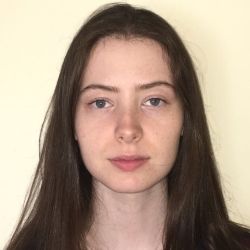
Richmal Paxton
Email: R.Paxton@uea.ac.uk
Profile
My primary research interests lie in the fields of sedimentology, Earth system science and paleoclimatology. I am particularly interested in the study of sedimentary diagenetic processes, and the reconstruction and analysis of paleoenvironmental conditions.
I obtained a BSc in Environmental Geoscience with First Class honours from Durham University in 2013. This degree gave me the opportunity to study a variety of Earth Science topics, with a firm backing in geology.
In 2015 I received an MSc in Climate Change with Distinction from UEA. Within this degree I was able to develop my interest in the Earth system, both in regards to present climate change and with respect to the investigation of past climates and environments. For my Masters dissertation I applied the Carbonate Clumped Isotope Paleothermometer to bulk rock and fossil samples from the late Cretaceous succession of the North Norfolk coast in order to examine changes in paleotemperature and seawater composition, with reference to previous studies in the region.
Current Research
Microbes mud mucus and minerals: deep-time record of microbial environments and processes.
Carbonate concretions are common in the geological record and are assumed to be by-products of microbial activity. However, the early biogeochemical processes involved in concretion formation remain ambiguous.
The aim of my project is to increase the understanding of the early chemical and physical modification of concretion bearing sediments by microbes.
I will be using the Carbonate Clumped Isotope Paleothermometer alongside other geochemical methods and data to establish cementation conditions, including reliable temperature estimates, which will help the understanding of time integrated pore water evolution.
Early microbial influences will be examined through organic geochemical analysis of concretions and parallel culture experiments that will simulate early environmental conditions.
Awards
2015: The Hubert H. Lamb Memorial Prize for best MSc Dissertation in Climate Change, UEA.
Supervisory team
Primary Supervisor: Prof. Julian Andrews (UEA)
Secondary Supervisor: Dr. Nikolai Pedentchouk (UEA)
Other supervisory team members:
Mr. Paul Dennis (UEA)
Dr. Alina Marca (UEA)
Ryan E Brock
Email: Ryan.Brock@uea.ac.uk
Profile
I graduated from UEA in 2015 with a BSc (Hons) in Biological Sciences, mainly focusing on evolutionary biology, genetics and ecology during my time there. My research interests mainly involve the evolution of sociality in the bees, wasps and ants. I spent my undergraduate dissertation investigating the epigenetic mechanisms underlying sociality in the bumblebee, Bombus terrestris, under the supervision of Professor Andrew Bourke. This, in combination, with my taking of the social evolution module, kick-started my enthusiasm for the social insects and prompted me to study them further.
Following my undergraduate degree, I began a Master’s by Research in the lab of Dr. Seirian Sumner at the University of Bristol. My research involved the analysis of caste differentiation in the Neotropical swarm-founding wasp, Polybia quadricincta, followed by the sequencing, construction and subsequent analysis of the transcriptomes of both P. quadricincta and Angiopolybia pallens (another swarm-founding wasp). Alongside this, I was also involved in a large review which dealt with the economic and ecological value of wasps. I am currently in the process of writing up and defending my Master’s thesis and am looking forward to returning to UEA in January.
Current Research
Social organisation of the tree bumblebee (Bombus hypnorum)
Given their importance as pollinators, the decline of bumblebees – thought to be a result of agricultural intensification – is highly concerning. Interestingly, Bombus hypnorum represents a particularly novel case when compared to other species of bumblebee, having spread rapidly throughout the UK since its natural colonisation from continental Europe in 2001 to become one of the most common bumblebee species. Previous research has hinted at the ecological reasons for B. hypnorum’s success in the UK but, to date, little is known of its social organisation and how this may contribute to its success.
Co-operation among nest-mates and the dynamics of colony cycles are two highly variable traits across bumblebee species. Often, as a result of relatedness differences between nest members, there is conflict between the queen and her workers over male production and ratios of sexual brood. However, unlike other bumblebee species, B. hypnorum queens may mate with multiple males which, according to inclusive fitness predictions, should increase colony co-operation. However, previous tests of this have been inconclusive. Furthermore, there is anecdotal evidence that B. hypnorum undergoes two colony cycles per year (which would make it the first species of bumblebee in the UK to do so) but this hasn’t yet been completely proven.
Therefore, this project will make use of colony censuses, behavioural observations and microsatellites to elucidate the colony cycle dynamics and levels of co-operation and conflict within nests of B. hypnorum and whether such characteristics are helpful in explaining its success in the UK.
Publications
Sumner, S. & Brock, R.E. (2016) In defence of wasps: why squashing them comes with a sting in the tail. The Conversation.
Brock, R.E. & Sumner, S. (2016) Social wasps: No ASBO required. Professional Pest Controller, 84, pp. 16-19.
Conferences
International Union for the Study of Social Insects NW European Section Meeting, 17-18th December 2015, University of Bristol.
Supervisory Team
Professor Andrew Bourke, University of East Anglia
Dr. Seirian Sumner, University College London (previously University of Bristol)
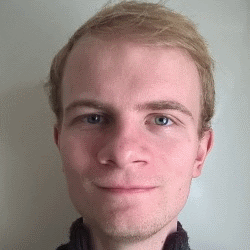
Ryan Gilchrist
School of Environmental Sciences, University of East AngliaEmail: r.gilchrist@uea.ac.uk
Ryan Gilchrist
Email: r.gilchrist@uea.ac.uk
Profile
I recently graduated from the University of East Anglia with a degree in MSci Meteorology and Oceanography. My studies focussed on renewable energy, fluid dynamics, and the physical interactions between the atmosphere and oceans.
My third year project involved numerically modelling the response of the ocean to a category five hurricane, using 1-Dimensional parameterization in Matlab. More recently, I have completed a research project entitled “Tidal Power in the Pentland Firth – Turbine-Flow Feedback Mechanisms in a Multi-Channel System”, which incorporated the use of TELEMAC2D to numerically model tidal stream farms of differing sizes, to assess resultant impacts on ocean dynamics. TELEMAC2D is an open source model, and the project involved heavy modification of FORTRAN code.
Over the summer, I participated in a week-long research project in Oban, Scotland, in which microstructure Seagliders were deployed for sensor testing purposes. I am hoping to use this experience in the future, to take observations relevant to my PhD research project.
Current research
“Dynamics and Mitigation of Mid-Water Column Oil Spills”
My PhD project will investigate the potential impacts of an oil spill in the Faroe-Shetland Channel (FSC). The FSC is a dynamically complex region of the ocean, featuring multiple water masses, mesoscale eddies, internal waves, extreme surface waves, and strong along-slope currents at the shelf edge. Deep water exploration is venturing further into this region, and these key processes need to be correctly modelled for emergency response purposes.
Specifically, the hypothesis that “mesoscale eddies and internal waves are important mechanisms for across-pycnocline mixing and across-slope transport of oil” will be investigated. To do this, I am hoping to use both pure hydrodynamic models (UKMO, FASTNEt), as well as CEFAS-operated spill models (OSCAR, Chemspill).
I am eager to investigate the potential use of Seagliders as part of a rapid response system for oil dispersion monitoring after a spill, and to do a sensitivity analysis of potential oil trajectories towards Marine Protected Areas. The outcome of this project will ideally be used to improve the advice on mitigation and rapid response measures, whilst reducing uncertainty when producing uncertainty plans for site development.
Grants
NERC Industrial CASE Studentship (48 Months)
Awards
2015: Alan Preston prize for outstanding work in oceanography (UEA)
Conferences
2014: UEA-Cefas Marine Modelling Symposium
Supervisory team:
Dr Robert Hall (UEA)
Prof Karen Heywood (UEA)
Dr John Bacon (Cefas)
Mr Jon Rees (Cefas)
Other relevant activities
- Student Mentor: Bright Futures Residential Program, Holt Hall, Norfolk
- Work Experience: WeatherQuest (UEA)
- Teaching Assistant: Holt Hall, Norfolk
- Forest Schools Helper: West Earlham Infant School, Norfolk
- GreenWatch and WildlifeWatch leader: Great Fen Project, Woodwalton Fen, Cambridgeshire
- Student Helper: “A Pinch of Salt”, UEA Open Day, Norfolk
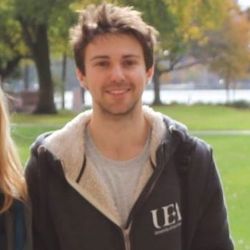
Sam Prudence
Email: S.Prudence@uea.ac.uk
Profile
I am a molecular biologist particularly interested in plant-microbe interactions and synthetic biology. Over the course of my career my aim is to apply knowledge from these fields to help contribute solutions to global issues such as food security, climate change and antibiotic resistance.
I started my studies at the University of East Anglia in 2013 on a Science Foundation year, progressing on to a BSc in Molecular Biology & Genetics and graduating in 2017. My research dissertation focused on MtrA, a transcription factor in Streptomyces linked to antibiotic synthesis and spore development.
Over the summer of 2016 I worked on the UEA’s team for that years International Genetically Engineered Machine Competition (iGEM). As an interdisciplinary team of 9 undergraduates we explored applications for hydrogenase enzymes in Shewanella oneidensis, hoping to address the intermittency problem associated with renewable energy. In addition, we planned and executed multiple science communication projects, including making a molecular VR experience to showcase the system of proteins we were working with in an immersive way.
Current Research
‘Understanding the symbiosis between antibiotic-producing Streptomyces bacteria and plant roots’
My research focuses on the endophyte microbiome of plant roots. Specifically, the bacteria Streptomyces, and the role they play within this community. Streptomyces are highly capable producers of a vast array of bioactive compounds and compose a significant proportion of the root endo-microbiome. One question I hope to address is whether they are using this capability to protect the host plants from pestilence or to modulate the microbial communities’ composition.
Using Arabidopsis thaliana as a model system I will explore this question using various molecular techniques including transcriptome analyses and genome editing. Overall, I want to better understand the underlying molecular mechanisms of these interactions, and their biological functions. For example, Streptomyces possess a type seven secretion system (T7SS), a homolog of this system in Staphylococcus aureus functions to kill competing bacteria. Systems such as this are possible mechanisms by which Streptomyces could modulate microbial community organisation, and I intend to explore this hypothesis experimentally.
I am also interested in exploring the extent to which plant-microbe interactions could be harnessed to augment crop productivity. Humanity will need creative innovations to meet the projected increase in global food demand, better understanding the function of endosymbiotic bacteria could yield invaluable insights and technological capabilities.
Awards
Silver medal: iGEM 2016
Conferences
October 2016: iGEM competition in Boston, poster presentation and talk.
Supervisory Team
Primary: Professor Matt Hutchings (UEA)
Secondary: Professor Anne Osbourne (JIC), Professor Colin Murrell (UEA)
Other relevant activities
Presented a molecular VR experience at the 2016 Norwich Science Festival and gave a short talk on synthetic biology and climate change.
Helper during a “painting with fluorescent bacteria” activity for the 2016 Sainsbury Centre for Visual Arts Art & Nature Summer School.

Sarah Barnsley
Email: S.Barnsley@uea.ac.uk
Profile
I have long been interested in the interdependence of agriculture and the natural environment and the sustainability of farming systems as we go into the future, both in terms of the environment/biodiversity, and for meeting the resource needs of the global human population. I therefore completed an MSc in Conservation Science at Imperial College London between October 2013 and September 2014 and prior to that, a BSc in Animal Science at the University of Reading. Topics studied included; the valuation of natural resources, the importance of ecosystem services, organic farming, livestock production systems, and the impacts of climate change.
My MSc thesis studied land manager attitudes towards agri-environment schemes, while my BSc dissertation involved an analysis of vitamin D content in eggs from different types of production system. In addition to the theory, I have gained practical experience on a variety of different farms including on a smallholding in the UK countryside, a pastoral farm in the Swiss Alps and on an urban farm in central London.
Upon leaving University, I worked as a Conservation Assistant and then Officer for the UK Overseas Territories Conservation Forum. This role kept me up to date with some of the most pressing environmental and social issues. For example, I was involved in writing a submission in response to an Environmental Audit Committee (EAC) Inquiry. This was looking to assess whether UK Government is on track in terms of implementing their 'blue-belt' policy, which involves establishing Marine Protected Areas around the UK and UK's Overseas Territories.
PhD Title
Managing pollination services at farm-scale: making ‘ecological intensification’ a reality.
Awards
While at the University of Reading, I received in my first year the Chancellor’s Award for academic achievement. In my final year, I received an achievement award for the best overall contribution to the BSc Animal Science.
Conferences
During my time with the UK Overseas Territories Conservation Forum (UKOTCF), I helped to run an international conference of UK territories conservation practitioners and policy-makers. The conference entitled ‘Sustaining Partnerships’ was jointly organised by UKOTCF and HM Government of Gibraltar. I also represented UKOTCF at various meetings such as those held by the All-Party Parliamentary Group on Biodiversity and the annual Inter Island Environment Meeting for the Crown Dependencies. In 2017, I helped to run a second meeting of Environment Ministers of UK Overseas Territories and Crown Dependencies in Alderney.
As part of my MSc, I had the opportunity to attend and listen to the talks at a ZSL symposium focusing upon carnivore responses to environmental change.
Research group(s)/Laboratories etc
Primary Supervisor: Dr Lynn Dicks
Secondary Supervisors: Professor Andrew Lovett; Dominic Bovis (H L Hutchinson Ltd)
Other relevant activities
In addition to my work and study in the environment/agricultural sectors, I have participated in various volunteering programmes. For example, I was part of a team that organised activities for refugee children. I also volunteered with a nomadic family in Mongolia, where activities included helping out with livestock husbandry.
While at the University of Reading I acted as a Student Ambassador, introducing prospective students to the Animal Science course on open days. I have also been a science tutor on a part-time basis. In my spare time I enjoy hiking up in the mountains, exploring nature, travelling and discovering new places, horse-riding and dancing. As a personal project, I am working on a series of children’s stories and travel-related articles.
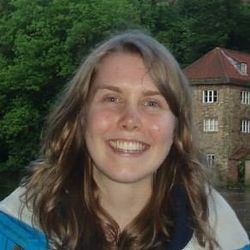
Sarah Worsley
Email: S.Worsley@uea.ac.uk
Profile
I am fascinated by the evolution of biological systems and, in particular, how social interactions between organisms arise and are maintained. I also have a keen interest in systems that are relevant to human health and enjoy communicating my work to the public.
I began my studies with a degree in Biological Sciences at the University of Oxford, graduating in 2014, where I studied a broad collection of topics ranging from plant biochemistry to social evolution. After my bachelors, I completed an MSc in Evolution, Ecology and Conservation at Imperial College London. My thesis focussed on the human gut microbiome, a bacterial community whose functioning and composition plays a fundamental role in maintaining human health. More specifically, I investigated how species diversity influenced the emergence of antibiotics resistance in simplified communities of commensal gut bacteria.
Current research
Phd title: Partner Choice: the chemical ecology of microbiomes
Many organisms maintain stable, mutually beneficial interactions with bacterial communities. However, a key question is how the host organism is able to maintain this relationship exclusively with beneficial bacteria, since cheats that take the benefits but do not reciprocate are expected to arise.
My PhD investigates this “Partner Choice” problem by studying South American leafcutter ants and the bacteria that reside on their cuticles. This beneficial bacterial community produces antibiotics which protect the fungal gardens, farmed by the ants, against invading pathogens. It is thought that to maintain a mutualistic relationship, the ant host provides public resources such that antibiotic producers are maintained at high abundance and suppress other bacteria that do not produce antibiotics.
My research will use a range of newly developed techniques including Stable Isotope Probing to track the flow of resources through the fungal-ant-bacterial chain. I will also be investigating known and novel antibiotics in vitro, but also on the surface of the ants using mass spectrometry imaging techniques established at the John Innes Centre (https://www.jic.ac.uk/ ). The ant system is not only intriguing but a useful model, since the external nature of the microbiome makes it easy to manipulate. The findings are also likely to have important ramifications for the current antibiotic crisis.
Research group
Primary Supervisor: Dr Matthew Hutchings (UEA)
Secondary Supervisors: Prof Colin Murrell (UEA), Dr Doug Yu (UEA), Prof Barrie Wilkinson (John Innes Centre)
Awards
• Michael Zola Prize (August 2012) Keble College University of Oxford, for outstanding performance in examinations.
• Academic Scholarships awarded by the University of Oxford, for first-class results in September 2012 and 2013.
• NERC Studentship 2015
Other activities:
Science communication: I have written science news articles for BANG! Science magazine, University of Oxford as well as biology articles for I-Science magazine, Imperial College London.

Seth C. Thomas
Email: Seth.Thomas@uea.ac.uk
ORCiD: 0000-0001-7966-7526
Academic profile
I graduated from the University of Plymouth in 2012 with a BSc (Hons) Marine Biology and Coastal Ecology. Since then, I’ve worked as a freelance writer, writing and blogging on all things science as well as in other fields. Writing is something that I have decided to continue part time while further progressing my scientific career. The first step on this path was working in a environmental analysis lab for Huntingdon Life Sciences, during which I was given an insight into the world of chromatography. This led me nicely up to the start of my current PhD programme at UEA, working with Dr Gill Malin and Dr Martin Johnson investigating the global importance of diatoms as DMSP producers.
Working with diatoms is fascinating, yet a departure from my research comfort zone. In previous research projects, I’ve worked with a group of scientists investigating the impact of ocean acidification on calcifying organisms. For further details on this work, please refer to the publications section of this profile. Although my current work is a new direction for me, it’s an exciting challenge that I will relish throughout the coming years. I find the intricacies of phytoplankton biogeochemical cycling absolutely fascinating, and I am continually amazed by the level of life that goes unseen in as little as a single drop of sea water.
PhD title and current research
The title of my PhD programme is ‘Do Diatoms Play An Important Global Role in the Production of DMS and it’s Precursor DMSP?’. In order to give a well rounded view of the topic and to gain as many skills as possible during my time as a PhD student, my supervisory team and I have decided to take a multifaceted approach to answering this question. Here, we will combine numerous techniques such as gas chromatography and fluorescence microscopy to attempt to unravel the intricate web of processes and limiting factors associated with diatomatic DMSP production.
This research is very relevant to modern science, and particularly climate change. DMS is a climatically active gas, which not only is a key transport pathway in the sulphur cycle, but also has potential counter active effects on global warming. This is due to the sulphur contained in the compound acting as cloud condensation nuclei increasing the Earth’s albedo and solar reflection, thus cooling temperatures. It was previously though that DMSP was only produced in significant volumes by Dinophyceae and Prymesiophyceae, however this has been shown not to be the case. By investigating diatoms, we can build a clearer and more accurate picture of global DMS cycling, as well as aim to add their production levels to existing global models to better predict changing global temperatures.
Research groups
Climate, Ocean and Atmospheric Sciences (COAS) research theme, School of Environmental Sciences, UEA
Centre for Environment, Fisheries & Aquaculture Science (Cefas), Defra.
Other activities
Currently, I run a blog for the EnvEast DTP student cohort. Here, myself and guest bloggers give an insight into life as part of the EnvEast cohort, as well as PhD research in general.

Shenjie Zhou
School of Environmental Sciences, University of East AngliaEmail: Shenjie.Zhou@uea.ac.uk
Shenjie Zhou
Email: Shenjie.Zhou@uea.ac.uk
ORCiD: 0000-0002-9124-6270 | ResearchGate
Biography
2014-2015: MSc Oceanography (Distinction), Department of Ocean and Earth Science, University of Southampton, UK
2010-2014: BSc Marine Sciences, School of Marine Sciences, Nanjing University of Information Science & Technology, China
Research experience
2015.4 - 2015.9
Department of Ocean and Earth Science, University of Southampton
Supervisor: Professor Sybren Drijfhout
Title: Northern North Atlantic Heat Budget in Warming Hiatus Period
2013.12 - 2014.6
School of Marine Science, Nanjing University of Information Science & Technology
Supervisor: Professor Biao Zhang
Title: Assessment of Sea Surface Salinity Derived by Aquarius/SAC-D in Pacific Northwest
2012.06 - 2013.12
School of Marine Science, Nanjing University of Information Science & Technology
Supervisor: Professor Xiang. S. Liang
Title: Generating and Control of Karman Vortex Street
PhD title: Weather’s impact on Ocean Circulation
Momentum and energy fluxes at the air-sea interface, which play a fundamental role in driving the circulations of both then oceans and atmosphere in our climate systems, are observed to vary on a vast range of spatial and temporal scales. A significant part of these air-sea fluxes is caused by mesoscale weather systems that are too small and too short-lived to be properly resolved by the current generation of global climate models. Recent modelling studies suggest that the ocean circulation can be very sensitive to air-sea fluxes associated with unresolved weather systems such as polar lows and tip jets. However, a systematic study of the impact of these weather systems on global ocean circulation is still lacking. Furthermore, the underlying physical mechanisms remain unclear.
The overall aim of the project is to improve our understanding of mesoscale weather system effects on regional and global ocean circulations. This is an exciting new research area with many important climatic implications including, for example future mesoscale weather parameterization in global climate models.
Supervisors
Main supervisor: Dr Xiaoming Zhai, School of Environmental Sciences, UEA
Co-supervisor: Prof Ian Renfrew, School of Environmental Sciences, UEA
Other activities
43 days (17 Oct- 2 Dec 2015) of sea-going experience on the RAPID Cruise DY039 (RV Discovery) as ADCP data processor.

Solomon Udochi
School of Environmental Sciences, University of East AngliaSolomon Udochi
Email: S.Udochi@uea.ac.uk
ORCiD: 0000-0003-3761-0585 | LinkedIn
PhD title: Predicting the ecological effects of heavy metals in marine sediments.
My research explores the link between metal contamination in marine sediments, bioavailability to aquatic biota, and the resulting adverse ecological effects. It would involve a combination of long-term and short-term laboratory and field studies. Field studies shall be carried out at the Fal and Hayle estuaries in the South-West of England.
Biography
- Born in Lagos Island, Nigeria
- BSc Animal and Environmental Biology, Abia State University, Uturu. (Sep. 2007 – Sep. 2011)
BSc thesis title: Diesel oil: its effects on soil qualities and acute toxicity on yeast cells (Saccharomyces cerevisiae)
- Science Teacher, Methodist High School, Ekiti. (Aug. 2012 – Jun. 2013)
- MSc Environmental Assessment and Management, University of Salford, Manchester. (Sep. 2013 – Jan. 2015)
MSc thesis title: Heavy metal accumulation and depuration by the brown shrimp (Crangon crangon) in the Mersey Estuary, United Kingdom.
- Assistant Lecturer, Animal and Environmental Biology, Abia State University, Uturu. (2015 – Present -- on study leave)
Awards
- Commonwealth Doctoral Scholarship. 2016.
- Tertiary Education Trust Fund [TETFund] (Nigeria) Doctoral Scholarship – Declined. 2016.
- NDDC Foreign Postgraduate Scholarship (Full MSc scholarship). 2013.
- Vice Chancellor’s Prize for the University Overall Best Graduating Student at the 22nd Convocation Ceremony, Abia State University, Nigeria. 2013.
- Best Graduating Student, Faculty of Sciences, Abia State University, Nigeria. 2010/2011.
- Best Graduating Student, Department of Animal and Environmental Biology, Abia State University, Nigeria. 2010/2011.
- Ochendo Scholarship Endowment for Best Student from Ikwuano Local Government Area, Abia State Nigeria (Full Scholarship for one year of undergraduate study). 2011.
Grants
- Heavy metal concentrations in edible macro-invertebrates and fish in Oguta Lake, Imo State, Nigeria. 2016. Co-researcher. Funding body: TETFund Nigeria.
- Studies on the mutagenicity, cytotoxicity and genotoxicity potentials of the Nekede, Owerri municipal landfill leachate and the impact on groundwater quality. 2016. Co-researcher. Funding body: TETFund Nigeria.
- The use of some locally-sourced plants in Okigwe, Imo State and environs in the management of diabetes mellitus. 2016. Co-researcher. Funding body: TETFund Nigeria.
Supervisor and research group
Prof Alastair Grant, Environmental Biology group, School of Environmental Sciences, UEA

Stephanie Goodwin
School of Environmental Sciences, University of East AngliaEmail: Stephanie.Goodwin@uea.ac.uk
Stephanie Goodwin
Email: Stephanie.Goodwin@uea.ac.uk
ORCiD: 0000-0001-7453-3780 | LinkedIn
Profile
I graduated from Cardiff University with a BSc (Hons) in Environmental Geoscience in 2013. This included a one year industrial placement on the Island of Samos, Greece and the Island of Nosy Be in Madagascar, where I joined active research groups studying the anthropogenic impact of agriculture and deforestation on local ecosystems.
In 2014 I completed a Master’s Degree at Cardiff University in Applied Environmental Geology which included studies in geotechnics and soil mechanics. In November of that year, I was employed by Arcadis Consulting UK as an Environmental Engineer. I worked on large projects in the environment team, including the Gatwick Runway 2 Project and the Croydon Residential Project.
Modules taken as part of my Environmental Geoscience degree at Cardiff University first instilled my interest in ocean and atmospheric science. I developed an understanding for the proposed mechanisms for climate variations on a range of timescales and the complexities of the proxies used to study past climates, all of which strengthened my interest in the subject and fuelled my decision to pursue a research career in climate science.
PhD title: The Sun, the stratosphere, and seasonal climate prediction
The project’s aim is to understand the role of monthly solar variability on the stratosphere, and how such variability might affect the monthly and seasonal prediction of surface weather and climate. I will be joining the research group at UEA in meteorology, oceanology and climate, and will collaborate with scientists at the Met Office. The work will use a combination of observation, theory, climate models as well as the state-of-the-art seasonal prediction system at the Met Office. The project will contribute to the growing research in seasonal prediction and space weather.
Research Groups
- Centre for Ocean and Atmospheric Sciences, School of Environmental Sciences, UEA
- Climate Research Unit
- Tyndall Centre for Climate Change Research

Stewart Leigh
School of Biological Sciences, University of East AngliaEmail: Stewart.Leigh@uea.ac.uk
Stewart Leigh
Email: Stewart.Leigh@uea.ac.uk | ORCiD
Profile
My research interests lie primarily in ecology and evolution. I am particularly interested in the effect of human activity on ecosystems and how species evolve in response to this.
I completed my BSc in Biology at Bangor university from 2010 – 2013. I took my second year abroad to study in Oregon, a hotspot for wildlife due to the variety of ecosystems it contains in a relatively small area, from mountains and forests to deserts and coastal habitats. This piqued my interest in ecology and I completed my dissertation looking at the various methods of camouflage that spiders use in cloaking themselves from visual predators such as birds.
In 2013 – 2014 I undertook an MSc in evolutionary and population biology at the University of Bath. Here I combined my interest in ecology with evolution and genetics, leading me to complete a dissertation that encompassed them all. I investigated the evolutionary history behind the plant Cakile maritima and how it has managed to adapt and establish itself on coastlines around the world.
Now I am continuing with a NERC funded PhD at UEA entitled: Reproductive character displacement in insect control.
Current research
My research project will be looking at closely related insect vectors, their mating habits and the phenomenon known as “satyrization,” where hybrid mating results in reduced fitness for one of the species only. Satyrization diminishes the population of the species by preventing females from mating again after hybrid mating has occurred and has the effect of culling the disease which it carries. This is of great interest for those looking to eradicate insect-borne disease as it offers an ecologically safe way of controlling vector populations. An adaptation to prevent this has been observed however, resulting in a more robust mate recognition system, creating a mating barrier between the two species. I will be specifically looking at the mechanisms underlying these fitness costs and how quickly the species can evolve resistance.
Secondly I will be looking at how underdominance can be used as a method of population control for disease vectors. This will involve constructing transgenic strains of vector species and investigating how quickly the underdominant transgene can replace the wild-type allele. It is once again predicted that mating barriers will evolve between wild-type and transgenic strains and I shall be looking at how quickly this develops.
Supervisory team
Prof Tracey Chapman – University of East Anglia
Prof Luke Alphey – Institute of Animal Health

Stuart Umbo
Email: S.Umbo@uea.ac.uk | ORCiD: 0000-0001-7828-0266
Profile
Stuart graduated from the University of Leeds in 2006 with an honours degree in physics before embarking on a career in science communication working at numerous institutions, notably the Royal Institution and Science Museum. During his time at the latter he spent two years researching and writing the content for their flagship climate change exhibition, developing a keen interest and passion for the subject.
In 2012 Stuart embarked on a masters degree in climate change at University College London, conducting stable isotope analysis on a late Pleistocene/early Holocene speleothem from Central Bulgaria to infer a 120ka paleoclimatic record for his dissertation. After graduation Stuart continued to work in science communication, providing scientific consultancy for productions at the Royal Court Theatre and communication training for early career scientists at the Imperial College Grantham Institute among other exciting projects.
Current research
Stuart's PhD aims to achieve a better understanding of temperature changes in the subpolar North Atlantic during transitions from glacial to interglacial periods, as well as on millennial timescales, using the emerging field of clumped isotope analysis of foraminiferal species. Clumped isotopes - the degree of to which heavier isotopes 'clump' together in the foraminiferal's calcite shell – have the potential to allow the creation of a paleothermometer by separating temperature changes from other local variations in water composition, making them advantageous to conventional stable isotope analysis. Analysis will initially focus on the current and previous interglacial as well as the last glacial maximum and be used to better constrain existing stable isotope records.
The currents in the North Atlantic have a significant impact on global climate through their redistribution of heat from equatorial regions to the higher latitudes. Thus better understanding of North Atlantic variations can provide valuable insight into the global climate system operation during the quaternary and inform climate modelling.
Other activities
Stuart has extensive public engagement experience with nearly a decade of working in science communication for numerous organisations including the Science Museum and Royal Institution.

Ulysse Pasquier
School of Environmental Sciences, University of East AngliaUlysse Pasquier
Email: U.Pasquier@uea.ac.uk
Profile
Having completed a bachelor’s degree in Physical Geography and Political Science from McGill University in Canada, I went on to graduate with distinction from the MSc Global Environmental Change at King’s College London. My dissertation assessed the impacts of climatic changes on the performance of dams and reservoirs. I then studied Environmental Management as part of an Advanced Master held in China and France, which led me to work with Veolia on the definition of integrated water management strategies. In the months prior to starting my PhD, I participated in natural hazard research at the EDF Energy R&D Centre in London.
I am originally from the South of France, a vulnerable region that is not only threatened by sea level rise but which has also experienced serious storms in recent years. My research interests include: climate change adaptation and mitigation, flood risks and water management.
Current research
PhD title: Modelling future flood risk for adaptation planning of coastal and inland flooding: a case study of the Broads
Global mean sea levels are increasing due to climate change and are predicted to continue to do so for the foreseeable future. Sea-level rise is expected to have a wide range of impacts on coastal communities, natural environments and infrastructure. While adaptation measures are necessary, they will not only depend on local conditions, but also on stakeholder perception of scientific information.
Taking Britain’s largest wetland – the Broads – as a case study, my PhD project will look into the implications of adaptation options on compound flood risk and salinity changes as well as explore the processes of co-production of knowledge for decision-making. The final objective of my research will be to provide recommendations for integrated flood management and adaptation policies.
Supervisory team
Primary supervisor: Dr Helen He
Secondary supervisor: Dr Marisa Goulden
Other supervisory team members: Prof Kevin Hiscock, Simon Hooton (Broads Authority)

Vanessa Kienmoser
Email: V.Kienmoser@uea.ac.uk
ORCiD | LinkedIn | Academia.edu
Profile
Before commencing my academic career, I completed a RYA/ISA Yacht- Master sailing course in Ireland, which helped me to improve my team working and leading skills.
My main research interest are algae, before I came to University I started using seaweed for cooking and offered rocky shore trips to identify edible algae in Ireland. I created an educational website about seaweed identification, in collaboration with Dr Andrew Davies. Moreover, I wrote my bachelor dissertation about ‘The role of phlorotannins in regard to phenotypic plasticity in macro algae; A Review of distribution, impact of development and ecology’. To further enhance my laboratory skills and knowledge about microbiology I chose a Masters project focusing on enteric viruses in collaboration with VIRAQUA and NERC (www.viraqua.uk). This enabled me to write my Master’s thesis about the ‘Surveillance of enteric viruses in sediment and shellfish; Quantification of optimum extraction method and viral assemblages’.
Current Research
MY PhD project is about the halogen production of macro algae and their impact on the ecosystem and climate. The demand for seaweeds as food and/or fuel source is continuously rising, causing an increase of aquacultures. Therefore, it is important to determine algae species with the lowest emissions, to enable sustainable seaweed production in future. The gas exchange on a microbiological scale needs to be studied further, improving our understanding of the interactions between and impacts of bacterial communities living on the algae’s surface as well as in the sea- surface- microlayer i.e. atmospheric flux. We will include data from previous measurements and conduct different experiments (in vivo/ in vitro) with temperate and tropical algal species, further data will be gathered in collaboration with aquacultures in Asia (Malaysia, Vietnam and/or China).
Conferences
Lead student organising the Phycology Society meeting 2017 at Bangor University in collaboration with Dr Andrew Davies.
Poster presentation at Bangor University 2017 ‘Most efficient Method for determining enteric viruses found in shellfish and sediment’
Supervisory Team
Dr Gill Malin (UEA)
Prof Bill Sturges (UEA)
Emma Elvidge (UEA
Other relevant activities
RYA/ISA Yacht- master sailing.
Student Representative in first year at Bangor University.
Educational Rocky shore trips in Co. Kerry, Ireland.
Development and admin of educational website about seaweed identification and recipes in collaboration with Dr Andrew Davies; www.seaweeds.org.uk.
Lead student organising the Phycology Society meeting 2017 at Bangor University in collaboration with Dr Andrew Davies.

Yanhui Liu
Email: Yanhui.Liu@uea.ac.uk
ORCiD: 0000-0001-6396-9781
Profile
I graduated with a bachelor degree in Environmental Science from University of East Anglia in the summer of 2015. Generally I am interested in atmospheric chemistry and air pollution. My undergraduate dissertation is about analysing the temporal and special Aerosol Optical Depth (AOD) variation in China from 2000 to 2013. In 2014, I participate in a research on aerosol modelling and monitoring in Qingdao and helped them collect AOD data by using lidar.
Current research
Air pollution in China has become a major issue for public health. The assessment of human exposure to pollution and ability to test potential policy interventions are dependent on the ability to simulate pollutant concentrations across very large urban – so called megacities. The main aim of my PhD program is to examine the factors controlling air pollution in China by using a 3-D global model (UM-UKCA). The main focus on this program will be on the interaction of biogenic and anthropogenic emission and their impact on air quality.

Yanxin Wang
Email: Yanxin.Wang@uea.ac.uk
Profile
I got a Bachelor Degree of Science in Atmospheric Science from Ocean University of China and a master degree of Natural Science in Physical Oceanography from Xiamen University. My undergraduate dissertation is about to forecast the bottom temperature of Coastal East China Sea based on the atmospheric conditions. The subject of my Master’s thesis is “Variability of the Kuroshio Extension sea surface temperature front”.
Current Research
‘Antarctic shelf sea processes’
I will use the glider data to assess the small-scale spatial and temporal characteristics of the water masses on Antarctic shelf. All the temporal and spatial variability will be compared with the coupled climate models available for CMIP. Of particular interest will be the comparison of the Weddell, Ross and Amundsen Seas. By comparing the observational and modeling estimates, I will assess the capability of state-of-the art ocean and climate models and find their deficiencies. Idealised and sensitivity experiments with the aim of better representation of Antarctic water masses and shelf processes will also be undertaken so that I can identify key Antarctic shelf processes that have to be included in future climate models.
Publications
Wang, Yanxin, Xiaoyi Yang, and Jianyu Hu. Position variability of the Kuroshio Extension sea surface temperature front. Acta Oceanologica Sinica 35.7 (2016): 30-35.
Conferences
- International Workshop on South China Sea Coastal and Ocean Meso-scale Processes, 05/2016, Hongkong
- Poster presentation “Position variability of the Kuroshio Extension sea surface temperature front”
- The Third Xiamen Symposium on Marine Environmental Sciences, 01/2017, Xiamen
- Poster presentation “Intensity variability of the Kuroshio Extension sea surface temperature front”
Supervisory Team

Yoav Perlman
Email: y.perlman@uea.ac.uk
BlogSpot | Twitter | Facebook
Academic profile
MSc in Desert Ecology, Ben Gurion University, Israel, 2004-7. Thesis title: Foraging ecology, body temperature patterns and space use characteristics of the Nubian Nightjar, Caprimulgus nubicus, in Israel.
BSc in Life Sciences, Ben Gurion University, Israel, 2001-4.
PhD title
"Conservation Effectiveness of EU Natura 2000 Management and Agri-environment Prescriptions: Land Use and Population Changes of Great Bustard in Iberia."
Current research
The Great Bustard (Otis tarda) is globally Vulnerable. Up to 70% of the global population are in Iberia, but despite intensive research and conservation measures, small sub-populations are declining or have become extinct. This process has negative implications for the future conservation of the species.
This project will analyse the effect of land-use changes on Great Bustard sub-populations in Extremadura (Spain) and Alentejo (Portugal), using novel methods to link land-use changes to sub-population trends on a regional, long-term scale.
Grants
The Jacob Blaustein Institute for Desert Research Full Scholarship (2004 – 2007)
Ornithological Society for the Middle East Research Grant (2005)
Awards
Merav Ziv Graduate Student Award for Excellence in Ecology (2006)
Giddi Zakkay Fund for leading conservationists Research Award (2005)
Publications
Perlman, Y., and Tsurim, I. (2008). Daring, risk assessment and body condition interactions in steppe buzzards Buteo buteo vulpinus. Journal of Avian Biology 39: 226-228.
Perlman, Y., and Meyrav, J. (2009). Checklist of the Birds of Israel. Society for the Protection of nature in Israel publications.
In addition, multiple publications in popular magazines.
Research groups
Primary supervisor: Dr Paul Dolman (UEA),
Co-supervisors: Dr John Burnside (UEA), Prof Nigel Collar (BirdLife International), Dr João Paulo Silva (University of Lisbon).
Centre for Ecology, Evolution, and Conservation (UEA)
Organisms and the Environment research theme, School of Biological Sciences (UEA).
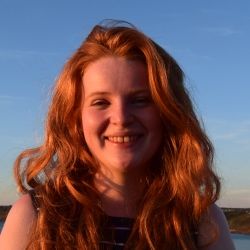
Zara Botterell
Email: zb17393@essex.ac.uk
Profile
I am a PhD student at the University of Essex, based at Plymouth Marine Laboratory. My research interests lie broadly in anthropogenic threats to marine and freshwater environments. Previously at the University of Exeter (MSc & BSc) I have investigated the abundance and distribution of invasive plants around lakes in Cornwall, the effect of anthropogenic noise on the predator-prey relationship between sea bass and prawns and how climate change will affect fish communities in SW England including effects of the local fishing community.
Recently I have worked on marine turtle entanglement in anthropogenic debris and was the co-ordinator of the Marine Ecology and Conservation Network at the University of Exeter.
Current Research
‘The ingestion of microplastics by plankton, and implications for the wider marine ecosystem and human wellbeing’
Microplastics are ubiquitous pollutants within our oceans, highlighted as contaminants of global environmental and economic concern by governments and international agencies worldwide. Owing to their small size, previous research has shown that microplastics are readily ingested by zooplankton and this has led to reduced growth, reproduction and survival. In this PhD I aim to investigate the ingestion of microplastics by marine biota including the wider implications for the marine ecosystem and human wellbeing. To do this I will assess the spatial and temporal overlap between microplastics and plankton in the marine environment and therefore the probability of encounter. I will also assess the factors affecting bioavailability of microplastics to zooplankton and the potential of the organism to ingest microplastics. These are particularly important in determining impacts and levels of microplastic contamination on the marine food web including organisms consumed by humans.
Supervisory Team

